Yi Jing Hexagram 29
The hexagram: 29
An hexagram is a combination of six yin and yang lines.
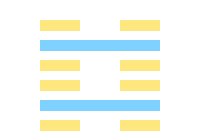
29 - THE KHAN HEXAGRAM.
Khan, here repeated, shows the possession of sincerity, through which the mind is penetrating. Action (in accordance with this) will be of high value.
Bing DeepL Google Yandex29 - K’ân, l’abîme
K’ān : danger, précipice, caverne. — Tsa k’ān : courir de grands risques ; s’exposer au danger pour un autre.
Texte
La droiture, le coeur fidèle et attaché, réussit ; ses actes ont de l’éclat s’il persévère malgré le danger.
Symbolisme
L’eau s’étendant au loin (deux fois eau) forme le Koua. Le sage, d’une vertu constante, agit vertueusement et s’applique à l’enseignement. Il répand ses biens comme l’eau.
Commentaire
Tsa k’ān est un danger grave. L’eau débordant, mais ne remplissant pas tout (que figure le Koua), représente les dangers courus sans qu’on perde sa fidélité constante. Le coeur attaché réussit ; quand la force garde le milieu, tout ce qu’on fait est bon et méritoire. Le ciel a ses dangers qu’on ne peut surmonter. La terre a les siens dans les montagnes, les fleuves et les ravins. Les rois et princes arrangent les choses dangereuses de manière à sauvegarder leurs États. Le moment du danger est bien grave.
29 - La profondeur
Quand les problèmes sont trop difficiles, on essaie de les contourner.
Bing DeepL Google YandexThe trigrams
The trigrams are combinations of three yin and yang lines. The three bottom lines of the hexagram form the lower trigram and represent the inner situation. The three top lines form the upper trigram and represent the outer situation.
Upper trigram: The water

Lower trigram: The water

Line Comments
The lines represent the evolution of the hexagram, from the bottom (young) to the top (old).
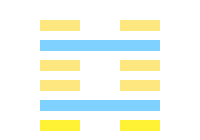
29.1 (29 > 60) - THE KHAN HEXAGRAM.
The first line, divided, shows its subject in the double defile, and (yet) entering a cavern within it. There will be evil.
Bing DeepL Google Yandex29.1 (29 > 60) - Dealing with problems in the right order
When one has encountered a difficulty, one must solve it before facing others.
Bing DeepL Google Yandex29.1 (29 > 60) - Dealing with problems in the right order
When one has encountered a difficulty, one must solve it before facing others.
Bing DeepL Google Yandex29.1 (29 > 60) - K’ân, l’abîme
K’ān : danger, précipice, caverne. — Tsa k’ān : courir de grands risques ; s’exposer au danger pour un autre.
Courir des dangers, comme entrer dans une caverne d’un défilé dangereux, est chose redoutable.
Bing DeepL Google Yandex29.1 (29 > 60) - Traiter les problèmes dans l'ordre
Quand on a rencontré une difficulté, on doit la résoudre avant d'en affronter d'autres.
Bing DeepL Google Yandex29.1 (29 > 60) - Mélység
Ha egy nehézséggel találkozott, meg kell oldania mielőtt elkezdene foglalkozni egy másikkal.
Bing DeepL Google Yandex
29.2 (29 > 8) - THE KHAN HEXAGRAM.
The second line, undivided, shows its subject in all the peril of the defile. He will, however, get a little (of the deliverance) that he seeks.
Bing DeepL Google Yandex29.2 (29 > 8) - Passing the buck
When one encounters difficulties that are too great, one leaves them to those who know how to handle them.
Bing DeepL Google Yandex29.2 (29 > 8) - Passing the buck
When one encounters difficulties that are too great, one leaves them to those who know how to handle them.
Bing DeepL Google Yandex29.2 (29 > 8) - K’ân, l’abîme
K’ān : danger, précipice, caverne. — Tsa k’ān : courir de grands risques ; s’exposer au danger pour un autre.
Dans les écueils périlleux, si on sait modérer ses sentiments, on pourra en sortir heureusement.
Si on garde la modération.
29.2 (29 > 8) - S'en remettre aux autres
Quand on rencontre des difficultés trop grandes, on laisse faire ceux qui savent les résoudre.
Bing DeepL Google Yandex29.2 (29 > 8) - Mélység
Ha valaki túl nagy nehézségekkel kerül szembe, rá kell hagynia olyanokra akik tudják kezelni azokat.
Bing DeepL Google Yandex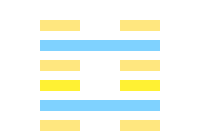
29.3 (29 > 48) - THE KHAN HEXAGRAM.
The third line, divided, shows its subject, whether he comes or goes ( = descends or ascends), confronted by a defile. All is peril to him and unrest. (His endeavours) will lead him into the cavern of the pit. There should be no action (in such a case).
Bing DeepL Google Yandex29.3 (29 > 48) - Leaving the field
Others notice what one has wasted, thus one leaves.
Bing DeepL Google Yandex29.3 (29 > 48) - Leaving the field
Others notice what one has wasted, thus one leaves.
Bing DeepL Google Yandex29.3 (29 > 48) - K’ân, l’abîme
K’ān : danger, précipice, caverne. — Tsa k’ān : courir de grands risques ; s’exposer au danger pour un autre.
Si en tout et partout on ne rencontre que danger, que les périls, les sujets de crainte s’accumulent, alors dans un tel danger, il n’y a plus d’expédient qui puisse servir. — Il n’y aura plus de secours possible.
Bing DeepL Google Yandex29.3 (29 > 48) - Abandonner le terrain
Les autres voient ce que l'on a gâché, alors on s'en va.
Bing DeepL Google Yandex
29.4 (29 > 47) - THE KHAN HEXAGRAM.
The fourth line, divided, shows its subject (at a feast), with (simply) a bottle of spirits, and a subsidiary basket of rice, while (the cups and bowls) are (only) of earthenware. He introduces his important lessons (as his ruler's) intelligence admits. There will in the end be no error.
Bing DeepL Google Yandex29.4 (29 > 47) - Living sparsely
When one has little means, one is content with simple things.
Bing DeepL Google Yandex29.4 (29 > 47) - Living sparsely
When one has little means, one is content with simple things.
Bing DeepL Google Yandex29.4 (29 > 47) - K’ân, l’abîme
K’ān : danger, précipice, caverne. — Tsa k’ān : courir de grands risques ; s’exposer au danger pour un autre.
Si l’on offre des sacrifices avec simplicité (sans ostentation), avec un vase de spiritueux et une corbeille de grains, tandis que les assistants n’ont que des vases de terre, si par cette modération on se forme à la vertu, alors qu’on aurait d’abord des difficultés et des écueils, on deviendra irréprochable. (Moyen d’éviter les dangers.)
Bing DeepL Google Yandex29.4 (29 > 47) - Vivre chichement
Quand on a peu de moyens, on se contente de choses simples.
Bing DeepL Google Yandex29.4 (29 > 47) - Mélység
Ha valaki eszközök híján van, meg kell elégednie egyszerű dolgokkal.
Bing DeepL Google Yandex
29.5 (29 > 7) - THE KHAN HEXAGRAM.
The fifth line, undivided, shows the water of the defile not yet full, (so that it might flow away) ; but order will (soon) be brought about. There will be no error.
Bing DeepL Google Yandex29.5 (29 > 7) - Going on vacation
Before returning to help others, one must take a break and prepare oneself to answer to one's relatives.
Bing DeepL Google Yandex29.5 (29 > 7) - Going on vacation
Before returning to help others, one must take a break and prepare oneself to answer to one's relatives.
Bing DeepL Google Yandex29.5 (29 > 7) - K’ân, l’abîme
K’ān : danger, précipice, caverne. — Tsa k’ān : courir de grands risques ; s’exposer au danger pour un autre.
Mais si le danger n’est pas inéluctable, si une caverne où l’on se trouve n’est point pleine d’eau et qu’on puisse encore aplanir le terrain, on en sortira sans faute. — Il n’arrivera pas malheur.
Bing DeepL Google Yandex29.5 (29 > 7) - Partir en congés
Avant de retourner aider les autres, on doit faire une pause et se préparer à répondre à ses proches.
Bing DeepL Google Yandex29.5 (29 > 7) - Mélység
Mielőtt visszatérne hogy segítsen másokon, szünetet kell tartania és fel kell készülnie hogy válaszoljon a közelállóknak.
Bing DeepL Google Yandex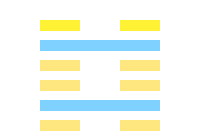
29.6 (29 > 59) - THE KHAN HEXAGRAM.
The topmost line, divided, shows its subject bound with cords of three strands or two strands, and placed in the thicket of thorns. But in three years he does not learn the course for him to pursue. There will be evil.
Bing DeepL Google Yandex29.6 (29 > 59) - Pausing
When it is too tiring, one can stop and resume later.
Bing DeepL Google Yandex29.6 (29 > 59) - Pausing
When it is too tiring, one can stop and resume later.
Bing DeepL Google Yandex29.6 (29 > 59) - K’ân, l’abîme
K’ān : danger, précipice, caverne. — Tsa k’ān : courir de grands risques ; s’exposer au danger pour un autre.
Danger de celui qui, lié, vinculé de triples liens, enfermé dans un cachot, ne peut de longtemps parvenir à se délivrer. Sort funeste ! — Tel est celui qui a perdu la voie de la sagesse
Bing DeepL Google Yandex29.6 (29 > 59) - Mettre en pause
Quand c'est trop fatiguant, on peut s'arrêter et reprendre plus tard.
Bing DeepL Google Yandex29.6 (29 > 59) - Mélység
Ha túl fáradt, meg kell állnia és később folytatnia.
Bing DeepL Google YandexThe nuclear hexagram: 27
The nuclear hexagram is the association of the two inner trigrams (lines 2,3,4 and 3,4,5). It represents the root, or the origin of the situation.

27 - THE Î HEXAGRAM.
Î indicates that with firm correctness there will be good fortune (in what is denoted by it). We must look at what we are seeking to nourish, and by the exercise of our thoughts seek for the proper aliment.
Bing DeepL Google Yandex27 - I, l’alimentation
Ī : 1. Entretenir, soutenir ; 2. Menton, côté de la bouche ; 3. Profond.
Texte
Entretenir : achève heureusement. (Il faut) examiner soigneusement comment on entretient. On doit chercher soi-même ce qui est bon pour sa bouche.
Symbolisme
Une montagne au-dessus du tonnerre (image de celui qui réprime ses désirs, restreint ses tendances). Le sage s’observe ainsi en ses paroles et modère l’usage des aliments.
Commentaire
Entretenir sa rectitude est cause de bonheur. On doit examiner ce que l’on entretient et ce qui doit nous entretenir. Le ciel et la terre entretiennent tout ; le saint entretient la sagesse pour atteindre par eux tous les peuples. Grande est l’opportunité de l’entretien.
The complementary hexagram: 30
The companion hexagram that makes the situation whole.

30 - THE LÎ HEXAGRAM.
Lî indicates that, (in regard to what it denotes), it will be advantageous to be firm and correct, and that thus there will be free course and success. Let (its subject) also nourish (a docility like that of) the cow, and there will be good fortune.
Bing DeepL Google Yandex30 - Lî, le feu
Lī : éclat, brillant, bel extérieur, succès.
Texte
Beauté, « bel extérieur », se développe et s’achève comme dans l’élevage d’un animal domestique (qui, bien soigné, est gras, beau, luisant).
Symbolisme
La lumière du soleil doublée (en dessus et en dessous) forme le Koua. Le grand homme fait ainsi briller ses qualités de plus en plus dans les quatre régions.
Commentaire
Le soleil et la lune brillent dans le ciel ; les grains, les plantes brillent sur la terre. Un double éclat brille dans tout ce qui est droit et juste et transforme, en le perfectionnant, tout ce qui existe ici-bas.
The mirror hexagram: 29
The mirror hexagram shows a movement in the reverse direction. When an hexagram is its own mirror, it either means that the hexagram goes in both directions or does not move at all.

29 - THE KHAN HEXAGRAM.
Khan, here repeated, shows the possession of sincerity, through which the mind is penetrating. Action (in accordance with this) will be of high value.
Bing DeepL Google Yandex29 - K’ân, l’abîme
K’ān : danger, précipice, caverne. — Tsa k’ān : courir de grands risques ; s’exposer au danger pour un autre.
Texte
La droiture, le coeur fidèle et attaché, réussit ; ses actes ont de l’éclat s’il persévère malgré le danger.
Symbolisme
L’eau s’étendant au loin (deux fois eau) forme le Koua. Le sage, d’une vertu constante, agit vertueusement et s’applique à l’enseignement. Il répand ses biens comme l’eau.
Commentaire
Tsa k’ān est un danger grave. L’eau débordant, mais ne remplissant pas tout (que figure le Koua), représente les dangers courus sans qu’on perde sa fidélité constante. Le coeur attaché réussit ; quand la force garde le milieu, tout ce qu’on fait est bon et méritoire. Le ciel a ses dangers qu’on ne peut surmonter. La terre a les siens dans les montagnes, les fleuves et les ravins. Les rois et princes arrangent les choses dangereuses de manière à sauvegarder leurs États. Le moment du danger est bien grave.
29 - La profondeur
Quand les problèmes sont trop difficiles, on essaie de les contourner.
Bing DeepL Google YandexMutations

29 - THE KHAN HEXAGRAM.
Khan, here repeated, shows the possession of sincerity, through which the mind is penetrating. Action (in accordance with this) will be of high value.
Bing DeepL Google Yandex29 - K’ân, l’abîme
K’ān : danger, précipice, caverne. — Tsa k’ān : courir de grands risques ; s’exposer au danger pour un autre.
Texte
La droiture, le coeur fidèle et attaché, réussit ; ses actes ont de l’éclat s’il persévère malgré le danger.
Symbolisme
L’eau s’étendant au loin (deux fois eau) forme le Koua. Le sage, d’une vertu constante, agit vertueusement et s’applique à l’enseignement. Il répand ses biens comme l’eau.
Commentaire
Tsa k’ān est un danger grave. L’eau débordant, mais ne remplissant pas tout (que figure le Koua), représente les dangers courus sans qu’on perde sa fidélité constante. Le coeur attaché réussit ; quand la force garde le milieu, tout ce qu’on fait est bon et méritoire. Le ciel a ses dangers qu’on ne peut surmonter. La terre a les siens dans les montagnes, les fleuves et les ravins. Les rois et princes arrangent les choses dangereuses de manière à sauvegarder leurs États. Le moment du danger est bien grave.
29 - La profondeur
Quand les problèmes sont trop difficiles, on essaie de les contourner.
Bing DeepL Google Yandex
29.1 (29 > 60) - THE KHAN HEXAGRAM.
The first line, divided, shows its subject in the double defile, and (yet) entering a cavern within it. There will be evil.
Bing DeepL Google Yandex29.1 (29 > 60) - Dealing with problems in the right order
When one has encountered a difficulty, one must solve it before facing others.
Bing DeepL Google Yandex29.1 (29 > 60) - Dealing with problems in the right order
When one has encountered a difficulty, one must solve it before facing others.
Bing DeepL Google Yandex29.1 (29 > 60) - K’ân, l’abîme
K’ān : danger, précipice, caverne. — Tsa k’ān : courir de grands risques ; s’exposer au danger pour un autre.
Courir des dangers, comme entrer dans une caverne d’un défilé dangereux, est chose redoutable.
Bing DeepL Google Yandex29.1 (29 > 60) - Traiter les problèmes dans l'ordre
Quand on a rencontré une difficulté, on doit la résoudre avant d'en affronter d'autres.
Bing DeepL Google Yandex29.1 (29 > 60) - Mélység
Ha egy nehézséggel találkozott, meg kell oldania mielőtt elkezdene foglalkozni egy másikkal.
Bing DeepL Google Yandex
29.2 (29 > 8) - THE KHAN HEXAGRAM.
The second line, undivided, shows its subject in all the peril of the defile. He will, however, get a little (of the deliverance) that he seeks.
Bing DeepL Google Yandex29.2 (29 > 8) - Passing the buck
When one encounters difficulties that are too great, one leaves them to those who know how to handle them.
Bing DeepL Google Yandex29.2 (29 > 8) - Passing the buck
When one encounters difficulties that are too great, one leaves them to those who know how to handle them.
Bing DeepL Google Yandex29.2 (29 > 8) - K’ân, l’abîme
K’ān : danger, précipice, caverne. — Tsa k’ān : courir de grands risques ; s’exposer au danger pour un autre.
Dans les écueils périlleux, si on sait modérer ses sentiments, on pourra en sortir heureusement.
Si on garde la modération.
29.2 (29 > 8) - S'en remettre aux autres
Quand on rencontre des difficultés trop grandes, on laisse faire ceux qui savent les résoudre.
Bing DeepL Google Yandex29.2 (29 > 8) - Mélység
Ha valaki túl nagy nehézségekkel kerül szembe, rá kell hagynia olyanokra akik tudják kezelni azokat.
Bing DeepL Google Yandex
29.1.2 (29 > 3) - THE KHAN HEXAGRAM.
- 1. The first line, divided, shows its subject in the double defile, and (yet) entering a cavern within it. There will be evil.
- 2. The second line, undivided, shows its subject in all the peril of the defile. He will, however, get a little (of the deliverance) that he seeks.
29.1.2 (29 > 3) - Getting away with a pirouette
One thinks having made a blunder even though the others didn't notice anything.
Bing DeepL Google Yandex29.1.2 (29 > 3) - Getting away with a pirouette
One thinks having made a blunder even though the others didn't notice anything.
Bing DeepL Google Yandex29.1.2 (29 > 3) - K’ân, l’abîme
K’ān : danger, précipice, caverne. — Tsa k’ān : courir de grands risques ; s’exposer au danger pour un autre.
- 1. Courir des dangers, comme entrer dans une caverne d’un défilé dangereux, est chose redoutable.
-
2. Dans les écueils périlleux, si on sait modérer ses sentiments, on pourra en sortir heureusement.
Si on garde la modération.
29.1.2 (29 > 3) - S'en sortir avec une pirouette
On pense avoir commis une gaffe bien que les autres n'aient rien remarqué.
Bing DeepL Google Yandex29.1.2 (29 > 3) - Mélység
- 1. Ha egy nehézséggel találkozott, meg kell oldania mielőtt elkezdene foglalkozni egy másikkal.
- 2. Ha valaki túl nagy nehézségekkel kerül szembe, rá kell hagynia olyanokra akik tudják kezelni azokat.

29.3 (29 > 48) - THE KHAN HEXAGRAM.
The third line, divided, shows its subject, whether he comes or goes ( = descends or ascends), confronted by a defile. All is peril to him and unrest. (His endeavours) will lead him into the cavern of the pit. There should be no action (in such a case).
Bing DeepL Google Yandex29.3 (29 > 48) - Leaving the field
Others notice what one has wasted, thus one leaves.
Bing DeepL Google Yandex29.3 (29 > 48) - Leaving the field
Others notice what one has wasted, thus one leaves.
Bing DeepL Google Yandex29.3 (29 > 48) - K’ân, l’abîme
K’ān : danger, précipice, caverne. — Tsa k’ān : courir de grands risques ; s’exposer au danger pour un autre.
Si en tout et partout on ne rencontre que danger, que les périls, les sujets de crainte s’accumulent, alors dans un tel danger, il n’y a plus d’expédient qui puisse servir. — Il n’y aura plus de secours possible.
Bing DeepL Google Yandex29.3 (29 > 48) - Abandonner le terrain
Les autres voient ce que l'on a gâché, alors on s'en va.
Bing DeepL Google Yandex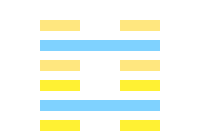
29.1.3 (29 > 5) - THE KHAN HEXAGRAM.
- 1. The first line, divided, shows its subject in the double defile, and (yet) entering a cavern within it. There will be evil.
- 3. The third line, divided, shows its subject, whether he comes or goes ( = descends or ascends), confronted by a defile. All is peril to him and unrest. (His endeavours) will lead him into the cavern of the pit. There should be no action (in such a case).
29.1.3 (29 > 5) - Repeating the demonstration
One presents facts that others have already experienced.
Bing DeepL Google Yandex29.1.3 (29 > 5) - Repeating the demonstration
One presents facts that others have already experienced.
Bing DeepL Google Yandex29.1.3 (29 > 5) - K’ân, l’abîme
K’ān : danger, précipice, caverne. — Tsa k’ān : courir de grands risques ; s’exposer au danger pour un autre.
- 1. Courir des dangers, comme entrer dans une caverne d’un défilé dangereux, est chose redoutable.
- 3. Si en tout et partout on ne rencontre que danger, que les périls, les sujets de crainte s’accumulent, alors dans un tel danger, il n’y a plus d’expédient qui puisse servir. — Il n’y aura plus de secours possible.
29.1.3 (29 > 5) - Refaire la démonstration
On présente des faits que les autres ont déjà expérimentés.
Bing DeepL Google Yandex29.1.3 (29 > 5) - Mélység
- 1. Ha egy nehézséggel találkozott, meg kell oldania mielőtt elkezdene foglalkozni egy másikkal.
- 3. Látják amit elrontott így odébbáll.

29.2.3 (29 > 39) - THE KHAN HEXAGRAM.
- 2. The second line, undivided, shows its subject in all the peril of the defile. He will, however, get a little (of the deliverance) that he seeks.
- 3. The third line, divided, shows its subject, whether he comes or goes ( = descends or ascends), confronted by a defile. All is peril to him and unrest. (His endeavours) will lead him into the cavern of the pit. There should be no action (in such a case).
29.2.3 (29 > 39) - Refreshing one's skills
One remembers the times when one was able to master one's subject.
Bing DeepL Google Yandex29.2.3 (29 > 39) - Refreshing one's skills
One remembers the times when one was able to master one's subject.
Bing DeepL Google Yandex29.2.3 (29 > 39) - K’ân, l’abîme
K’ān : danger, précipice, caverne. — Tsa k’ān : courir de grands risques ; s’exposer au danger pour un autre.
-
2. Dans les écueils périlleux, si on sait modérer ses sentiments, on pourra en sortir heureusement.
Si on garde la modération. - 3. Si en tout et partout on ne rencontre que danger, que les périls, les sujets de crainte s’accumulent, alors dans un tel danger, il n’y a plus d’expédient qui puisse servir. — Il n’y aura plus de secours possible.
29.2.3 (29 > 39) - Se remettre à niveau
On se souvient des fois où l'on avait pu maîtriser son sujet.
Bing DeepL Google Yandex29.2.3 (29 > 39) - Mélység
- 2. Ha valaki túl nagy nehézségekkel kerül szembe, rá kell hagynia olyanokra akik tudják kezelni azokat.
- 3. Látják amit elrontott így odébbáll.

29.1.2.3 (29 > 63) - THE KHAN HEXAGRAM.
- 1. The first line, divided, shows its subject in the double defile, and (yet) entering a cavern within it. There will be evil.
- 2. The second line, undivided, shows its subject in all the peril of the defile. He will, however, get a little (of the deliverance) that he seeks.
- 3. The third line, divided, shows its subject, whether he comes or goes ( = descends or ascends), confronted by a defile. All is peril to him and unrest. (His endeavours) will lead him into the cavern of the pit. There should be no action (in such a case).
29.1.2.3 (29 > 63) - Being governed by anger
One crystallizes one's rejections after having been the victim of an attack that one had feared.
Bing DeepL Google Yandex29.1.2.3 (29 > 63) - Being governed by anger
One crystallizes one's rejections after having been the victim of an attack that one had feared.
Bing DeepL Google Yandex29.1.2.3 (29 > 63) - K’ân, l’abîme
K’ān : danger, précipice, caverne. — Tsa k’ān : courir de grands risques ; s’exposer au danger pour un autre.
- 1. Courir des dangers, comme entrer dans une caverne d’un défilé dangereux, est chose redoutable.
-
2. Dans les écueils périlleux, si on sait modérer ses sentiments, on pourra en sortir heureusement.
Si on garde la modération. - 3. Si en tout et partout on ne rencontre que danger, que les périls, les sujets de crainte s’accumulent, alors dans un tel danger, il n’y a plus d’expédient qui puisse servir. — Il n’y aura plus de secours possible.
29.1.2.3 (29 > 63) - Être gouverné par la colère
On cristallise ses rejets après avoir été la victime d'une attaque que l'on avait redoutée.
Bing DeepL Google Yandex29.1.2.3 (29 > 63) - Mélység
- 1. Ha egy nehézséggel találkozott, meg kell oldania mielőtt elkezdene foglalkozni egy másikkal.
- 2. Ha valaki túl nagy nehézségekkel kerül szembe, rá kell hagynia olyanokra akik tudják kezelni azokat.
- 3. Látják amit elrontott így odébbáll.

29.4 (29 > 47) - THE KHAN HEXAGRAM.
The fourth line, divided, shows its subject (at a feast), with (simply) a bottle of spirits, and a subsidiary basket of rice, while (the cups and bowls) are (only) of earthenware. He introduces his important lessons (as his ruler's) intelligence admits. There will in the end be no error.
Bing DeepL Google Yandex29.4 (29 > 47) - Living sparsely
When one has little means, one is content with simple things.
Bing DeepL Google Yandex29.4 (29 > 47) - Living sparsely
When one has little means, one is content with simple things.
Bing DeepL Google Yandex29.4 (29 > 47) - K’ân, l’abîme
K’ān : danger, précipice, caverne. — Tsa k’ān : courir de grands risques ; s’exposer au danger pour un autre.
Si l’on offre des sacrifices avec simplicité (sans ostentation), avec un vase de spiritueux et une corbeille de grains, tandis que les assistants n’ont que des vases de terre, si par cette modération on se forme à la vertu, alors qu’on aurait d’abord des difficultés et des écueils, on deviendra irréprochable. (Moyen d’éviter les dangers.)
Bing DeepL Google Yandex29.4 (29 > 47) - Vivre chichement
Quand on a peu de moyens, on se contente de choses simples.
Bing DeepL Google Yandex29.4 (29 > 47) - Mélység
Ha valaki eszközök híján van, meg kell elégednie egyszerű dolgokkal.
Bing DeepL Google Yandex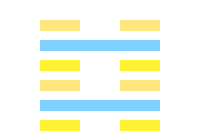
29.1.4 (29 > 58) - THE KHAN HEXAGRAM.
- 1. The first line, divided, shows its subject in the double defile, and (yet) entering a cavern within it. There will be evil.
- 4. The fourth line, divided, shows its subject (at a feast), with (simply) a bottle of spirits, and a subsidiary basket of rice, while (the cups and bowls) are (only) of earthenware. He introduces his important lessons (as his ruler's) intelligence admits. There will in the end be no error.
29.1.4 (29 > 58) - Reconnecting with one's old demons
One goes to the meeting despite the firm opposition of others.
Bing DeepL Google Yandex29.1.4 (29 > 58) - Reconnecting with one's old demons
One goes to the meeting despite the firm opposition of others.
Bing DeepL Google Yandex29.1.4 (29 > 58) - K’ân, l’abîme
K’ān : danger, précipice, caverne. — Tsa k’ān : courir de grands risques ; s’exposer au danger pour un autre.
- 1. Courir des dangers, comme entrer dans une caverne d’un défilé dangereux, est chose redoutable.
- 4. Si l’on offre des sacrifices avec simplicité (sans ostentation), avec un vase de spiritueux et une corbeille de grains, tandis que les assistants n’ont que des vases de terre, si par cette modération on se forme à la vertu, alors qu’on aurait d’abord des difficultés et des écueils, on deviendra irréprochable. (Moyen d’éviter les dangers.)
29.1.4 (29 > 58) - Renouer avec ses vieux démons
On se revoit bien que les autres s'y opposent fermement.
Bing DeepL Google Yandex29.1.4 (29 > 58) - Mélység
- 1. Ha egy nehézséggel találkozott, meg kell oldania mielőtt elkezdene foglalkozni egy másikkal.
- 4. Ha valaki eszközök híján van, meg kell elégednie egyszerű dolgokkal.

29.2.4 (29 > 45) - THE KHAN HEXAGRAM.
- 2. The second line, undivided, shows its subject in all the peril of the defile. He will, however, get a little (of the deliverance) that he seeks.
- 4. The fourth line, divided, shows its subject (at a feast), with (simply) a bottle of spirits, and a subsidiary basket of rice, while (the cups and bowls) are (only) of earthenware. He introduces his important lessons (as his ruler's) intelligence admits. There will in the end be no error.
29.2.4 (29 > 45) - Improvising a solution
One is sad that one cannot do more to help one's friends.
Bing DeepL Google Yandex29.2.4 (29 > 45) - Improvising a solution
One is sad that one cannot do more to help one's friends.
Bing DeepL Google Yandex29.2.4 (29 > 45) - K’ân, l’abîme
K’ān : danger, précipice, caverne. — Tsa k’ān : courir de grands risques ; s’exposer au danger pour un autre.
-
2. Dans les écueils périlleux, si on sait modérer ses sentiments, on pourra en sortir heureusement.
Si on garde la modération. - 4. Si l’on offre des sacrifices avec simplicité (sans ostentation), avec un vase de spiritueux et une corbeille de grains, tandis que les assistants n’ont que des vases de terre, si par cette modération on se forme à la vertu, alors qu’on aurait d’abord des difficultés et des écueils, on deviendra irréprochable. (Moyen d’éviter les dangers.)
29.2.4 (29 > 45) - Improviser une solution
On est triste de ne pas pouvoir faire davantage pour aider ses amis.
Bing DeepL Google Yandex29.2.4 (29 > 45) - Mélység
- 2. Ha valaki túl nagy nehézségekkel kerül szembe, rá kell hagynia olyanokra akik tudják kezelni azokat.
- 4. Ha valaki eszközök híján van, meg kell elégednie egyszerű dolgokkal.

29.1.2.4 (29 > 17) - THE KHAN HEXAGRAM.
- 1. The first line, divided, shows its subject in the double defile, and (yet) entering a cavern within it. There will be evil.
- 2. The second line, undivided, shows its subject in all the peril of the defile. He will, however, get a little (of the deliverance) that he seeks.
- 4. The fourth line, divided, shows its subject (at a feast), with (simply) a bottle of spirits, and a subsidiary basket of rice, while (the cups and bowls) are (only) of earthenware. He introduces his important lessons (as his ruler's) intelligence admits. There will in the end be no error.
29.1.2.4 (29 > 17) - Not making too many concessions
One refuses to let others take command of operations.
Bing DeepL Google Yandex29.1.2.4 (29 > 17) - Not making too many concessions
One refuses to let others take command of operations.
Bing DeepL Google Yandex29.1.2.4 (29 > 17) - K’ân, l’abîme
K’ān : danger, précipice, caverne. — Tsa k’ān : courir de grands risques ; s’exposer au danger pour un autre.
- 1. Courir des dangers, comme entrer dans une caverne d’un défilé dangereux, est chose redoutable.
-
2. Dans les écueils périlleux, si on sait modérer ses sentiments, on pourra en sortir heureusement.
Si on garde la modération. - 4. Si l’on offre des sacrifices avec simplicité (sans ostentation), avec un vase de spiritueux et une corbeille de grains, tandis que les assistants n’ont que des vases de terre, si par cette modération on se forme à la vertu, alors qu’on aurait d’abord des difficultés et des écueils, on deviendra irréprochable. (Moyen d’éviter les dangers.)
29.1.2.4 (29 > 17) - Ne pas trop faire de concessions
On refuse de laisser les autres prendre le commandement des opérations.
Bing DeepL Google Yandex29.1.2.4 (29 > 17) - Mélység
- 1. Ha egy nehézséggel találkozott, meg kell oldania mielőtt elkezdene foglalkozni egy másikkal.
- 2. Ha valaki túl nagy nehézségekkel kerül szembe, rá kell hagynia olyanokra akik tudják kezelni azokat.
- 4. Ha valaki eszközök híján van, meg kell elégednie egyszerű dolgokkal.

29.3.4 (29 > 28) - THE KHAN HEXAGRAM.
- 3. The third line, divided, shows its subject, whether he comes or goes ( = descends or ascends), confronted by a defile. All is peril to him and unrest. (His endeavours) will lead him into the cavern of the pit. There should be no action (in such a case).
- 4. The fourth line, divided, shows its subject (at a feast), with (simply) a bottle of spirits, and a subsidiary basket of rice, while (the cups and bowls) are (only) of earthenware. He introduces his important lessons (as his ruler's) intelligence admits. There will in the end be no error.
29.3.4 (29 > 28) - Losing credit
One ruins one's reputation by attacking a helpless person.
Bing DeepL Google Yandex29.3.4 (29 > 28) - Losing credit
One ruins one's reputation by attacking a helpless person.
Bing DeepL Google Yandex29.3.4 (29 > 28) - K’ân, l’abîme
K’ān : danger, précipice, caverne. — Tsa k’ān : courir de grands risques ; s’exposer au danger pour un autre.
- 3. Si en tout et partout on ne rencontre que danger, que les périls, les sujets de crainte s’accumulent, alors dans un tel danger, il n’y a plus d’expédient qui puisse servir. — Il n’y aura plus de secours possible.
- 4. Si l’on offre des sacrifices avec simplicité (sans ostentation), avec un vase de spiritueux et une corbeille de grains, tandis que les assistants n’ont que des vases de terre, si par cette modération on se forme à la vertu, alors qu’on aurait d’abord des difficultés et des écueils, on deviendra irréprochable. (Moyen d’éviter les dangers.)
29.3.4 (29 > 28) - Perdre son crédit
On ruine sa réputation en agressant une personne sans défense.
Bing DeepL Google Yandex29.3.4 (29 > 28) - Mélység
- 3. Látják amit elrontott így odébbáll.
- 4. Ha valaki eszközök híján van, meg kell elégednie egyszerű dolgokkal.
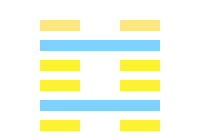
29.1.3.4 (29 > 43) - THE KHAN HEXAGRAM.
- 1. The first line, divided, shows its subject in the double defile, and (yet) entering a cavern within it. There will be evil.
- 3. The third line, divided, shows its subject, whether he comes or goes ( = descends or ascends), confronted by a defile. All is peril to him and unrest. (His endeavours) will lead him into the cavern of the pit. There should be no action (in such a case).
- 4. The fourth line, divided, shows its subject (at a feast), with (simply) a bottle of spirits, and a subsidiary basket of rice, while (the cups and bowls) are (only) of earthenware. He introduces his important lessons (as his ruler's) intelligence admits. There will in the end be no error.
29.1.3.4 (29 > 43) - Defiling one's environment
One finds an interest in making sordid jokes.
Bing DeepL Google Yandex29.1.3.4 (29 > 43) - Defiling one's environment
One finds an interest in making sordid jokes.
Bing DeepL Google Yandex29.1.3.4 (29 > 43) - K’ân, l’abîme
K’ān : danger, précipice, caverne. — Tsa k’ān : courir de grands risques ; s’exposer au danger pour un autre.
- 1. Courir des dangers, comme entrer dans une caverne d’un défilé dangereux, est chose redoutable.
- 3. Si en tout et partout on ne rencontre que danger, que les périls, les sujets de crainte s’accumulent, alors dans un tel danger, il n’y a plus d’expédient qui puisse servir. — Il n’y aura plus de secours possible.
- 4. Si l’on offre des sacrifices avec simplicité (sans ostentation), avec un vase de spiritueux et une corbeille de grains, tandis que les assistants n’ont que des vases de terre, si par cette modération on se forme à la vertu, alors qu’on aurait d’abord des difficultés et des écueils, on deviendra irréprochable. (Moyen d’éviter les dangers.)
29.1.3.4 (29 > 43) - Souiller son environnement
On trouve un intérêt à faire des blagues sordides.
Bing DeepL Google Yandex29.1.3.4 (29 > 43) - Mélység
- 1. Ha egy nehézséggel találkozott, meg kell oldania mielőtt elkezdene foglalkozni egy másikkal.
- 3. Látják amit elrontott így odébbáll.
- 4. Ha valaki eszközök híján van, meg kell elégednie egyszerű dolgokkal.

29.2.3.4 (29 > 31) - THE KHAN HEXAGRAM.
- 2. The second line, undivided, shows its subject in all the peril of the defile. He will, however, get a little (of the deliverance) that he seeks.
- 3. The third line, divided, shows its subject, whether he comes or goes ( = descends or ascends), confronted by a defile. All is peril to him and unrest. (His endeavours) will lead him into the cavern of the pit. There should be no action (in such a case).
- 4. The fourth line, divided, shows its subject (at a feast), with (simply) a bottle of spirits, and a subsidiary basket of rice, while (the cups and bowls) are (only) of earthenware. He introduces his important lessons (as his ruler's) intelligence admits. There will in the end be no error.
29.2.3.4 (29 > 31) - The palaver tree
One listens to others before giving them one's opinion.
Bing DeepL Google Yandex29.2.3.4 (29 > 31) - The palaver tree
One listens to others before giving them one's opinion.
Bing DeepL Google Yandex29.2.3.4 (29 > 31) - K’ân, l’abîme
K’ān : danger, précipice, caverne. — Tsa k’ān : courir de grands risques ; s’exposer au danger pour un autre.
-
2. Dans les écueils périlleux, si on sait modérer ses sentiments, on pourra en sortir heureusement.
Si on garde la modération. - 3. Si en tout et partout on ne rencontre que danger, que les périls, les sujets de crainte s’accumulent, alors dans un tel danger, il n’y a plus d’expédient qui puisse servir. — Il n’y aura plus de secours possible.
- 4. Si l’on offre des sacrifices avec simplicité (sans ostentation), avec un vase de spiritueux et une corbeille de grains, tandis que les assistants n’ont que des vases de terre, si par cette modération on se forme à la vertu, alors qu’on aurait d’abord des difficultés et des écueils, on deviendra irréprochable. (Moyen d’éviter les dangers.)
29.2.3.4 (29 > 31) - L'arbre à palabres
On écoute parler les autres avant de leur donner son avis.
Bing DeepL Google Yandex29.2.3.4 (29 > 31) - Mélység
- 2. Ha valaki túl nagy nehézségekkel kerül szembe, rá kell hagynia olyanokra akik tudják kezelni azokat.
- 3. Látják amit elrontott így odébbáll.
- 4. Ha valaki eszközök híján van, meg kell elégednie egyszerű dolgokkal.

29.1.2.3.4 (29 > 49) - THE KHAN HEXAGRAM.
- 1. The first line, divided, shows its subject in the double defile, and (yet) entering a cavern within it. There will be evil.
- 2. The second line, undivided, shows its subject in all the peril of the defile. He will, however, get a little (of the deliverance) that he seeks.
- 3. The third line, divided, shows its subject, whether he comes or goes ( = descends or ascends), confronted by a defile. All is peril to him and unrest. (His endeavours) will lead him into the cavern of the pit. There should be no action (in such a case).
- 4. The fourth line, divided, shows its subject (at a feast), with (simply) a bottle of spirits, and a subsidiary basket of rice, while (the cups and bowls) are (only) of earthenware. He introduces his important lessons (as his ruler's) intelligence admits. There will in the end be no error.
29.1.2.3.4 (29 > 49) - Committing the forbidden
One gets busy on a project that others condemn.
Bing DeepL Google Yandex29.1.2.3.4 (29 > 49) - Committing the forbidden
One gets busy on a project that others condemn.
Bing DeepL Google Yandex29.1.2.3.4 (29 > 49) - K’ân, l’abîme
K’ān : danger, précipice, caverne. — Tsa k’ān : courir de grands risques ; s’exposer au danger pour un autre.
- 1. Courir des dangers, comme entrer dans une caverne d’un défilé dangereux, est chose redoutable.
-
2. Dans les écueils périlleux, si on sait modérer ses sentiments, on pourra en sortir heureusement.
Si on garde la modération. - 3. Si en tout et partout on ne rencontre que danger, que les périls, les sujets de crainte s’accumulent, alors dans un tel danger, il n’y a plus d’expédient qui puisse servir. — Il n’y aura plus de secours possible.
- 4. Si l’on offre des sacrifices avec simplicité (sans ostentation), avec un vase de spiritueux et une corbeille de grains, tandis que les assistants n’ont que des vases de terre, si par cette modération on se forme à la vertu, alors qu’on aurait d’abord des difficultés et des écueils, on deviendra irréprochable. (Moyen d’éviter les dangers.)
29.1.2.3.4 (29 > 49) - Braver les interdits
On s'affaire autour d'un projet que les autres condamnent.
Bing DeepL Google Yandex29.1.2.3.4 (29 > 49) - Mélység
- 1. Ha egy nehézséggel találkozott, meg kell oldania mielőtt elkezdene foglalkozni egy másikkal.
- 2. Ha valaki túl nagy nehézségekkel kerül szembe, rá kell hagynia olyanokra akik tudják kezelni azokat.
- 3. Látják amit elrontott így odébbáll.
- 4. Ha valaki eszközök híján van, meg kell elégednie egyszerű dolgokkal.

29.5 (29 > 7) - THE KHAN HEXAGRAM.
The fifth line, undivided, shows the water of the defile not yet full, (so that it might flow away) ; but order will (soon) be brought about. There will be no error.
Bing DeepL Google Yandex29.5 (29 > 7) - Going on vacation
Before returning to help others, one must take a break and prepare oneself to answer to one's relatives.
Bing DeepL Google Yandex29.5 (29 > 7) - Going on vacation
Before returning to help others, one must take a break and prepare oneself to answer to one's relatives.
Bing DeepL Google Yandex29.5 (29 > 7) - K’ân, l’abîme
K’ān : danger, précipice, caverne. — Tsa k’ān : courir de grands risques ; s’exposer au danger pour un autre.
Mais si le danger n’est pas inéluctable, si une caverne où l’on se trouve n’est point pleine d’eau et qu’on puisse encore aplanir le terrain, on en sortira sans faute. — Il n’arrivera pas malheur.
Bing DeepL Google Yandex29.5 (29 > 7) - Partir en congés
Avant de retourner aider les autres, on doit faire une pause et se préparer à répondre à ses proches.
Bing DeepL Google Yandex29.5 (29 > 7) - Mélység
Mielőtt visszatérne hogy segítsen másokon, szünetet kell tartania és fel kell készülnie hogy válaszoljon a közelállóknak.
Bing DeepL Google Yandex
29.1.5 (29 > 19) - THE KHAN HEXAGRAM.
- 1. The first line, divided, shows its subject in the double defile, and (yet) entering a cavern within it. There will be evil.
- 5. The fifth line, undivided, shows the water of the defile not yet full, (so that it might flow away) ; but order will (soon) be brought about. There will be no error.
29.1.5 (29 > 19) - Preferring work over leisure
One favours efforts at the expense of boldness and creativity.
Bing DeepL Google Yandex29.1.5 (29 > 19) - Preferring work over leisure
One favors efforts at the expense of boldness and creativity.
Bing DeepL Google Yandex29.1.5 (29 > 19) - K’ân, l’abîme
K’ān : danger, précipice, caverne. — Tsa k’ān : courir de grands risques ; s’exposer au danger pour un autre.
- 1. Courir des dangers, comme entrer dans une caverne d’un défilé dangereux, est chose redoutable.
- 5. Mais si le danger n’est pas inéluctable, si une caverne où l’on se trouve n’est point pleine d’eau et qu’on puisse encore aplanir le terrain, on en sortira sans faute. — Il n’arrivera pas malheur.
29.1.5 (29 > 19) - Préférer le travail aux loisirs
On privilégie les efforts au détriment de l'audace et de la créativité.
Bing DeepL Google Yandex29.1.5 (29 > 19) - Mélység
- 1. Ha egy nehézséggel találkozott, meg kell oldania mielőtt elkezdene foglalkozni egy másikkal.
- 5. Mielőtt visszatérne hogy segítsen másokon, szünetet kell tartania és fel kell készülnie hogy válaszoljon a közelállóknak.
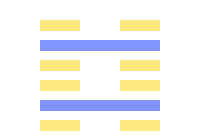
29.2.5 (29 > 2) - THE KHAN HEXAGRAM.
- 2. The second line, undivided, shows its subject in all the peril of the defile. He will, however, get a little (of the deliverance) that he seeks.
- 5. The fifth line, undivided, shows the water of the defile not yet full, (so that it might flow away) ; but order will (soon) be brought about. There will be no error.
29.2.5 (29 > 2) - K’ân, l’abîme
K’ān : danger, précipice, caverne. — Tsa k’ān : courir de grands risques ; s’exposer au danger pour un autre.
-
2. Dans les écueils périlleux, si on sait modérer ses sentiments, on pourra en sortir heureusement.
Si on garde la modération. - 5. Mais si le danger n’est pas inéluctable, si une caverne où l’on se trouve n’est point pleine d’eau et qu’on puisse encore aplanir le terrain, on en sortira sans faute. — Il n’arrivera pas malheur.
29.2.5 (29 > 2) - Mélység
- 2. Ha valaki túl nagy nehézségekkel kerül szembe, rá kell hagynia olyanokra akik tudják kezelni azokat.
- 5. Mielőtt visszatérne hogy segítsen másokon, szünetet kell tartania és fel kell készülnie hogy válaszoljon a közelállóknak.
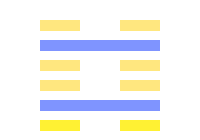
29.1.2.5 (29 > 24) - THE KHAN HEXAGRAM.
- 1. The first line, divided, shows its subject in the double defile, and (yet) entering a cavern within it. There will be evil.
- 2. The second line, undivided, shows its subject in all the peril of the defile. He will, however, get a little (of the deliverance) that he seeks.
- 5. The fifth line, undivided, shows the water of the defile not yet full, (so that it might flow away) ; but order will (soon) be brought about. There will be no error.
29.1.2.5 (29 > 24) - Ducking one's responsibilities
One takes refuge behind those one must defend.
Bing DeepL Google Yandex29.1.2.5 (29 > 24) - Ducking one's responsibilities
One takes refuge behind those one must defend.
Bing DeepL Google Yandex29.1.2.5 (29 > 24) - K’ân, l’abîme
K’ān : danger, précipice, caverne. — Tsa k’ān : courir de grands risques ; s’exposer au danger pour un autre.
- 1. Courir des dangers, comme entrer dans une caverne d’un défilé dangereux, est chose redoutable.
-
2. Dans les écueils périlleux, si on sait modérer ses sentiments, on pourra en sortir heureusement.
Si on garde la modération. - 5. Mais si le danger n’est pas inéluctable, si une caverne où l’on se trouve n’est point pleine d’eau et qu’on puisse encore aplanir le terrain, on en sortira sans faute. — Il n’arrivera pas malheur.
29.1.2.5 (29 > 24) - Fuir ses responsabilités
On se réfugie derrière ceux que l'on doit défendre.
Bing DeepL Google Yandex29.1.2.5 (29 > 24) - Mélység
- 1. Ha egy nehézséggel találkozott, meg kell oldania mielőtt elkezdene foglalkozni egy másikkal.
- 2. Ha valaki túl nagy nehézségekkel kerül szembe, rá kell hagynia olyanokra akik tudják kezelni azokat.
- 5. Mielőtt visszatérne hogy segítsen másokon, szünetet kell tartania és fel kell készülnie hogy válaszoljon a közelállóknak.

29.3.5 (29 > 46) - THE KHAN HEXAGRAM.
- 3. The third line, divided, shows its subject, whether he comes or goes ( = descends or ascends), confronted by a defile. All is peril to him and unrest. (His endeavours) will lead him into the cavern of the pit. There should be no action (in such a case).
- 5. The fifth line, undivided, shows the water of the defile not yet full, (so that it might flow away) ; but order will (soon) be brought about. There will be no error.
29.3.5 (29 > 46) - Expecting a negative answer
One replenishes oneself until the storm comes.
Bing DeepL Google Yandex29.3.5 (29 > 46) - Expecting a negative answer
One replenishes oneself until the storm comes.
Bing DeepL Google Yandex29.3.5 (29 > 46) - K’ân, l’abîme
K’ān : danger, précipice, caverne. — Tsa k’ān : courir de grands risques ; s’exposer au danger pour un autre.
- 3. Si en tout et partout on ne rencontre que danger, que les périls, les sujets de crainte s’accumulent, alors dans un tel danger, il n’y a plus d’expédient qui puisse servir. — Il n’y aura plus de secours possible.
- 5. Mais si le danger n’est pas inéluctable, si une caverne où l’on se trouve n’est point pleine d’eau et qu’on puisse encore aplanir le terrain, on en sortira sans faute. — Il n’arrivera pas malheur.
29.3.5 (29 > 46) - Attendre une réponse défavorable
On se remplume en attendant l'orage qui vient.
Bing DeepL Google Yandex29.3.5 (29 > 46) - Mélység
- 3. Látják amit elrontott így odébbáll.
- 5. Mielőtt visszatérne hogy segítsen másokon, szünetet kell tartania és fel kell készülnie hogy válaszoljon a közelállóknak.

29.1.3.5 (29 > 11) - THE KHAN HEXAGRAM.
- 1. The first line, divided, shows its subject in the double defile, and (yet) entering a cavern within it. There will be evil.
- 3. The third line, divided, shows its subject, whether he comes or goes ( = descends or ascends), confronted by a defile. All is peril to him and unrest. (His endeavours) will lead him into the cavern of the pit. There should be no action (in such a case).
- 5. The fifth line, undivided, shows the water of the defile not yet full, (so that it might flow away) ; but order will (soon) be brought about. There will be no error.
29.1.3.5 (29 > 11) - Making false accusations
One accuses one's relatives of wrongdoing they could not commit.
Bing DeepL Google Yandex29.1.3.5 (29 > 11) - Making false accusations
One accuses one's relatives of wrongdoing they could not commit.
Bing DeepL Google Yandex29.1.3.5 (29 > 11) - K’ân, l’abîme
K’ān : danger, précipice, caverne. — Tsa k’ān : courir de grands risques ; s’exposer au danger pour un autre.
- 1. Courir des dangers, comme entrer dans une caverne d’un défilé dangereux, est chose redoutable.
- 3. Si en tout et partout on ne rencontre que danger, que les périls, les sujets de crainte s’accumulent, alors dans un tel danger, il n’y a plus d’expédient qui puisse servir. — Il n’y aura plus de secours possible.
- 5. Mais si le danger n’est pas inéluctable, si une caverne où l’on se trouve n’est point pleine d’eau et qu’on puisse encore aplanir le terrain, on en sortira sans faute. — Il n’arrivera pas malheur.
29.1.3.5 (29 > 11) - Lancer de fausses accusations
On accuse ses proches de méfaits qu'ils n'ont pas pu commettre.
Bing DeepL Google Yandex29.1.3.5 (29 > 11) - Mélység
- 1. Ha egy nehézséggel találkozott, meg kell oldania mielőtt elkezdene foglalkozni egy másikkal.
- 3. Látják amit elrontott így odébbáll.
- 5. Mielőtt visszatérne hogy segítsen másokon, szünetet kell tartania és fel kell készülnie hogy válaszoljon a közelállóknak.
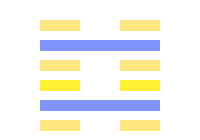
29.2.3.5 (29 > 15) - THE KHAN HEXAGRAM.
- 2. The second line, undivided, shows its subject in all the peril of the defile. He will, however, get a little (of the deliverance) that he seeks.
- 3. The third line, divided, shows its subject, whether he comes or goes ( = descends or ascends), confronted by a defile. All is peril to him and unrest. (His endeavours) will lead him into the cavern of the pit. There should be no action (in such a case).
- 5. The fifth line, undivided, shows the water of the defile not yet full, (so that it might flow away) ; but order will (soon) be brought about. There will be no error.
29.2.3.5 (29 > 15) - Losing ground
One warns one's friends that there will be more difficulties than expected.
Bing DeepL Google Yandex29.2.3.5 (29 > 15) - Losing ground
One warns one's friends that there will be more difficulties than expected.
Bing DeepL Google Yandex29.2.3.5 (29 > 15) - K’ân, l’abîme
K’ān : danger, précipice, caverne. — Tsa k’ān : courir de grands risques ; s’exposer au danger pour un autre.
-
2. Dans les écueils périlleux, si on sait modérer ses sentiments, on pourra en sortir heureusement.
Si on garde la modération. - 3. Si en tout et partout on ne rencontre que danger, que les périls, les sujets de crainte s’accumulent, alors dans un tel danger, il n’y a plus d’expédient qui puisse servir. — Il n’y aura plus de secours possible.
- 5. Mais si le danger n’est pas inéluctable, si une caverne où l’on se trouve n’est point pleine d’eau et qu’on puisse encore aplanir le terrain, on en sortira sans faute. — Il n’arrivera pas malheur.
29.2.3.5 (29 > 15) - Perdre pied
On prévient ses amis que l'on aura davantage de difficultés que prévu.
Bing DeepL Google Yandex29.2.3.5 (29 > 15) - Mélység
- 2. Ha valaki túl nagy nehézségekkel kerül szembe, rá kell hagynia olyanokra akik tudják kezelni azokat.
- 3. Látják amit elrontott így odébbáll.
- 5. Mielőtt visszatérne hogy segítsen másokon, szünetet kell tartania és fel kell készülnie hogy válaszoljon a közelállóknak.
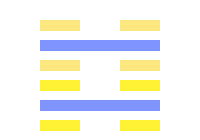
29.1.2.3.5 (29 > 36) - THE KHAN HEXAGRAM.
- 1. The first line, divided, shows its subject in the double defile, and (yet) entering a cavern within it. There will be evil.
- 2. The second line, undivided, shows its subject in all the peril of the defile. He will, however, get a little (of the deliverance) that he seeks.
- 3. The third line, divided, shows its subject, whether he comes or goes ( = descends or ascends), confronted by a defile. All is peril to him and unrest. (His endeavours) will lead him into the cavern of the pit. There should be no action (in such a case).
- 5. The fifth line, undivided, shows the water of the defile not yet full, (so that it might flow away) ; but order will (soon) be brought about. There will be no error.
29.1.2.3.5 (29 > 36) - Staying in one's inner circle
One often goes to see one's friends to have a good time with them.
Bing DeepL Google Yandex29.1.2.3.5 (29 > 36) - Staying in one's inner circle
One often goes to see one's friends to have a good time with them.
Bing DeepL Google Yandex29.1.2.3.5 (29 > 36) - K’ân, l’abîme
K’ān : danger, précipice, caverne. — Tsa k’ān : courir de grands risques ; s’exposer au danger pour un autre.
- 1. Courir des dangers, comme entrer dans une caverne d’un défilé dangereux, est chose redoutable.
-
2. Dans les écueils périlleux, si on sait modérer ses sentiments, on pourra en sortir heureusement.
Si on garde la modération. - 3. Si en tout et partout on ne rencontre que danger, que les périls, les sujets de crainte s’accumulent, alors dans un tel danger, il n’y a plus d’expédient qui puisse servir. — Il n’y aura plus de secours possible.
- 5. Mais si le danger n’est pas inéluctable, si une caverne où l’on se trouve n’est point pleine d’eau et qu’on puisse encore aplanir le terrain, on en sortira sans faute. — Il n’arrivera pas malheur.
29.1.2.3.5 (29 > 36) - Rester dans son cercle intime
On va souvent voir ses amis pour passer du bon temps avec eux.
Bing DeepL Google Yandex29.1.2.3.5 (29 > 36) - Mélység
- 1. Ha egy nehézséggel találkozott, meg kell oldania mielőtt elkezdene foglalkozni egy másikkal.
- 2. Ha valaki túl nagy nehézségekkel kerül szembe, rá kell hagynia olyanokra akik tudják kezelni azokat.
- 3. Látják amit elrontott így odébbáll.
- 5. Mielőtt visszatérne hogy segítsen másokon, szünetet kell tartania és fel kell készülnie hogy válaszoljon a közelállóknak.

29.4.5 (29 > 40) - THE KHAN HEXAGRAM.
- 4. The fourth line, divided, shows its subject (at a feast), with (simply) a bottle of spirits, and a subsidiary basket of rice, while (the cups and bowls) are (only) of earthenware. He introduces his important lessons (as his ruler's) intelligence admits. There will in the end be no error.
- 5. The fifth line, undivided, shows the water of the defile not yet full, (so that it might flow away) ; but order will (soon) be brought about. There will be no error.
29.4.5 (29 > 40) - Declaring one's undying love
One catches up with others to tell them that one loves them.
Bing DeepL Google Yandex29.4.5 (29 > 40) - Declaring one's undying love
One catches up with others to tell them that one loves them.
Bing DeepL Google Yandex29.4.5 (29 > 40) - K’ân, l’abîme
K’ān : danger, précipice, caverne. — Tsa k’ān : courir de grands risques ; s’exposer au danger pour un autre.
- 4. Si l’on offre des sacrifices avec simplicité (sans ostentation), avec un vase de spiritueux et une corbeille de grains, tandis que les assistants n’ont que des vases de terre, si par cette modération on se forme à la vertu, alors qu’on aurait d’abord des difficultés et des écueils, on deviendra irréprochable. (Moyen d’éviter les dangers.)
- 5. Mais si le danger n’est pas inéluctable, si une caverne où l’on se trouve n’est point pleine d’eau et qu’on puisse encore aplanir le terrain, on en sortira sans faute. — Il n’arrivera pas malheur.
29.4.5 (29 > 40) - Déclarer sa flamme
On rattrape les autres pour leur dire qu'on les aime.
Bing DeepL Google Yandex29.4.5 (29 > 40) - Mélység
- 4. Ha valaki eszközök híján van, meg kell elégednie egyszerű dolgokkal.
- 5. Mielőtt visszatérne hogy segítsen másokon, szünetet kell tartania és fel kell készülnie hogy válaszoljon a közelállóknak.

29.1.4.5 (29 > 54) - THE KHAN HEXAGRAM.
- 1. The first line, divided, shows its subject in the double defile, and (yet) entering a cavern within it. There will be evil.
- 4. The fourth line, divided, shows its subject (at a feast), with (simply) a bottle of spirits, and a subsidiary basket of rice, while (the cups and bowls) are (only) of earthenware. He introduces his important lessons (as his ruler's) intelligence admits. There will in the end be no error.
- 5. The fifth line, undivided, shows the water of the defile not yet full, (so that it might flow away) ; but order will (soon) be brought about. There will be no error.
29.1.4.5 (29 > 54) - Being gullible
One calculates one's interest without first checking what others are saying.
Bing DeepL Google Yandex29.1.4.5 (29 > 54) - Being gullible
One calculates one's interest without first checking what others are saying.
Bing DeepL Google Yandex29.1.4.5 (29 > 54) - K’ân, l’abîme
K’ān : danger, précipice, caverne. — Tsa k’ān : courir de grands risques ; s’exposer au danger pour un autre.
- 1. Courir des dangers, comme entrer dans une caverne d’un défilé dangereux, est chose redoutable.
- 4. Si l’on offre des sacrifices avec simplicité (sans ostentation), avec un vase de spiritueux et une corbeille de grains, tandis que les assistants n’ont que des vases de terre, si par cette modération on se forme à la vertu, alors qu’on aurait d’abord des difficultés et des écueils, on deviendra irréprochable. (Moyen d’éviter les dangers.)
- 5. Mais si le danger n’est pas inéluctable, si une caverne où l’on se trouve n’est point pleine d’eau et qu’on puisse encore aplanir le terrain, on en sortira sans faute. — Il n’arrivera pas malheur.
29.1.4.5 (29 > 54) - Être crédule
On calcule ses intérêts sans avoir au préalable vérifié ce que les autres disent.
Bing DeepL Google Yandex29.1.4.5 (29 > 54) - Mélység
- 1. Ha egy nehézséggel találkozott, meg kell oldania mielőtt elkezdene foglalkozni egy másikkal.
- 4. Ha valaki eszközök híján van, meg kell elégednie egyszerű dolgokkal.
- 5. Mielőtt visszatérne hogy segítsen másokon, szünetet kell tartania és fel kell készülnie hogy válaszoljon a közelállóknak.
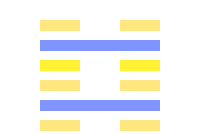
29.2.4.5 (29 > 16) - THE KHAN HEXAGRAM.
- 2. The second line, undivided, shows its subject in all the peril of the defile. He will, however, get a little (of the deliverance) that he seeks.
- 4. The fourth line, divided, shows its subject (at a feast), with (simply) a bottle of spirits, and a subsidiary basket of rice, while (the cups and bowls) are (only) of earthenware. He introduces his important lessons (as his ruler's) intelligence admits. There will in the end be no error.
- 5. The fifth line, undivided, shows the water of the defile not yet full, (so that it might flow away) ; but order will (soon) be brought about. There will be no error.
29.2.4.5 (29 > 16) - Going back into the ring
One puts one's title on the line to compete against one's opponents.
Bing DeepL Google Yandex29.2.4.5 (29 > 16) - Going back into the ring
One puts one's title on the line to compete against one's opponents.
Bing DeepL Google Yandex29.2.4.5 (29 > 16) - K’ân, l’abîme
K’ān : danger, précipice, caverne. — Tsa k’ān : courir de grands risques ; s’exposer au danger pour un autre.
-
2. Dans les écueils périlleux, si on sait modérer ses sentiments, on pourra en sortir heureusement.
Si on garde la modération. - 4. Si l’on offre des sacrifices avec simplicité (sans ostentation), avec un vase de spiritueux et une corbeille de grains, tandis que les assistants n’ont que des vases de terre, si par cette modération on se forme à la vertu, alors qu’on aurait d’abord des difficultés et des écueils, on deviendra irréprochable. (Moyen d’éviter les dangers.)
- 5. Mais si le danger n’est pas inéluctable, si une caverne où l’on se trouve n’est point pleine d’eau et qu’on puisse encore aplanir le terrain, on en sortira sans faute. — Il n’arrivera pas malheur.
29.2.4.5 (29 > 16) - Remonter sur le ring
On remet son titre en jeu pour se mesurer à ses opposants.
Bing DeepL Google Yandex29.2.4.5 (29 > 16) - Mélység
- 2. Ha valaki túl nagy nehézségekkel kerül szembe, rá kell hagynia olyanokra akik tudják kezelni azokat.
- 4. Ha valaki eszközök híján van, meg kell elégednie egyszerű dolgokkal.
- 5. Mielőtt visszatérne hogy segítsen másokon, szünetet kell tartania és fel kell készülnie hogy válaszoljon a közelállóknak.
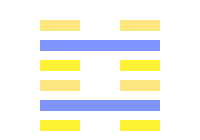
29.1.2.4.5 (29 > 51) - THE KHAN HEXAGRAM.
- 1. The first line, divided, shows its subject in the double defile, and (yet) entering a cavern within it. There will be evil.
- 2. The second line, undivided, shows its subject in all the peril of the defile. He will, however, get a little (of the deliverance) that he seeks.
- 4. The fourth line, divided, shows its subject (at a feast), with (simply) a bottle of spirits, and a subsidiary basket of rice, while (the cups and bowls) are (only) of earthenware. He introduces his important lessons (as his ruler's) intelligence admits. There will in the end be no error.
- 5. The fifth line, undivided, shows the water of the defile not yet full, (so that it might flow away) ; but order will (soon) be brought about. There will be no error.
29.1.2.4.5 (29 > 51) - Not wanting to serve
One is reluctant to make more efforts for others to benefit.
Bing DeepL Google Yandex29.1.2.4.5 (29 > 51) - Not wanting to serve
One is reluctant to make more efforts for others to benefit.
Bing DeepL Google Yandex29.1.2.4.5 (29 > 51) - K’ân, l’abîme
K’ān : danger, précipice, caverne. — Tsa k’ān : courir de grands risques ; s’exposer au danger pour un autre.
- 1. Courir des dangers, comme entrer dans une caverne d’un défilé dangereux, est chose redoutable.
-
2. Dans les écueils périlleux, si on sait modérer ses sentiments, on pourra en sortir heureusement.
Si on garde la modération. - 4. Si l’on offre des sacrifices avec simplicité (sans ostentation), avec un vase de spiritueux et une corbeille de grains, tandis que les assistants n’ont que des vases de terre, si par cette modération on se forme à la vertu, alors qu’on aurait d’abord des difficultés et des écueils, on deviendra irréprochable. (Moyen d’éviter les dangers.)
- 5. Mais si le danger n’est pas inéluctable, si une caverne où l’on se trouve n’est point pleine d’eau et qu’on puisse encore aplanir le terrain, on en sortira sans faute. — Il n’arrivera pas malheur.
29.1.2.4.5 (29 > 51) - Ne pas vouloir rendre service
On répugne à faire davantage d'efforts pour que les autres en profitent.
Bing DeepL Google Yandex29.1.2.4.5 (29 > 51) - Mélység
- 1. Ha egy nehézséggel találkozott, meg kell oldania mielőtt elkezdene foglalkozni egy másikkal.
- 2. Ha valaki túl nagy nehézségekkel kerül szembe, rá kell hagynia olyanokra akik tudják kezelni azokat.
- 4. Ha valaki eszközök híján van, meg kell elégednie egyszerű dolgokkal.
- 5. Mielőtt visszatérne hogy segítsen másokon, szünetet kell tartania és fel kell készülnie hogy válaszoljon a közelállóknak.

29.3.4.5 (29 > 32) - THE KHAN HEXAGRAM.
- 3. The third line, divided, shows its subject, whether he comes or goes ( = descends or ascends), confronted by a defile. All is peril to him and unrest. (His endeavours) will lead him into the cavern of the pit. There should be no action (in such a case).
- 4. The fourth line, divided, shows its subject (at a feast), with (simply) a bottle of spirits, and a subsidiary basket of rice, while (the cups and bowls) are (only) of earthenware. He introduces his important lessons (as his ruler's) intelligence admits. There will in the end be no error.
- 5. The fifth line, undivided, shows the water of the defile not yet full, (so that it might flow away) ; but order will (soon) be brought about. There will be no error.
29.3.4.5 (29 > 32) - Having it both ways
One refrains from choosing so as not to offend others.
Bing DeepL Google Yandex29.3.4.5 (29 > 32) - Having it both ways
One refrains from choosing so as not to offend others.
Bing DeepL Google Yandex29.3.4.5 (29 > 32) - K’ân, l’abîme
K’ān : danger, précipice, caverne. — Tsa k’ān : courir de grands risques ; s’exposer au danger pour un autre.
- 3. Si en tout et partout on ne rencontre que danger, que les périls, les sujets de crainte s’accumulent, alors dans un tel danger, il n’y a plus d’expédient qui puisse servir. — Il n’y aura plus de secours possible.
- 4. Si l’on offre des sacrifices avec simplicité (sans ostentation), avec un vase de spiritueux et une corbeille de grains, tandis que les assistants n’ont que des vases de terre, si par cette modération on se forme à la vertu, alors qu’on aurait d’abord des difficultés et des écueils, on deviendra irréprochable. (Moyen d’éviter les dangers.)
- 5. Mais si le danger n’est pas inéluctable, si une caverne où l’on se trouve n’est point pleine d’eau et qu’on puisse encore aplanir le terrain, on en sortira sans faute. — Il n’arrivera pas malheur.
29.3.4.5 (29 > 32) - Ménager la chèvre et le chou
On se retient de choisir pour ne pas vexer les autres.
Bing DeepL Google Yandex29.3.4.5 (29 > 32) - Mélység
- 3. Látják amit elrontott így odébbáll.
- 4. Ha valaki eszközök híján van, meg kell elégednie egyszerű dolgokkal.
- 5. Mielőtt visszatérne hogy segítsen másokon, szünetet kell tartania és fel kell készülnie hogy válaszoljon a közelállóknak.

29.1.3.4.5 (29 > 34) - THE KHAN HEXAGRAM.
- 1. The first line, divided, shows its subject in the double defile, and (yet) entering a cavern within it. There will be evil.
- 3. The third line, divided, shows its subject, whether he comes or goes ( = descends or ascends), confronted by a defile. All is peril to him and unrest. (His endeavours) will lead him into the cavern of the pit. There should be no action (in such a case).
- 4. The fourth line, divided, shows its subject (at a feast), with (simply) a bottle of spirits, and a subsidiary basket of rice, while (the cups and bowls) are (only) of earthenware. He introduces his important lessons (as his ruler's) intelligence admits. There will in the end be no error.
- 5. The fifth line, undivided, shows the water of the defile not yet full, (so that it might flow away) ; but order will (soon) be brought about. There will be no error.
29.1.3.4.5 (29 > 34) - Being unable to prove one's innocence
One finds one's things where the others have gone.
Bing DeepL Google Yandex29.1.3.4.5 (29 > 34) - Being unable to prove one's innocence
One finds one's things where the others have gone.
Bing DeepL Google Yandex29.1.3.4.5 (29 > 34) - K’ân, l’abîme
K’ān : danger, précipice, caverne. — Tsa k’ān : courir de grands risques ; s’exposer au danger pour un autre.
- 1. Courir des dangers, comme entrer dans une caverne d’un défilé dangereux, est chose redoutable.
- 3. Si en tout et partout on ne rencontre que danger, que les périls, les sujets de crainte s’accumulent, alors dans un tel danger, il n’y a plus d’expédient qui puisse servir. — Il n’y aura plus de secours possible.
- 4. Si l’on offre des sacrifices avec simplicité (sans ostentation), avec un vase de spiritueux et une corbeille de grains, tandis que les assistants n’ont que des vases de terre, si par cette modération on se forme à la vertu, alors qu’on aurait d’abord des difficultés et des écueils, on deviendra irréprochable. (Moyen d’éviter les dangers.)
- 5. Mais si le danger n’est pas inéluctable, si une caverne où l’on se trouve n’est point pleine d’eau et qu’on puisse encore aplanir le terrain, on en sortira sans faute. — Il n’arrivera pas malheur.
29.1.3.4.5 (29 > 34) - Être incapable de prouver son innocence
On retrouve ses affaires là où les autres se sont rendus.
Bing DeepL Google Yandex29.1.3.4.5 (29 > 34) - Mélység
- 1. Ha egy nehézséggel találkozott, meg kell oldania mielőtt elkezdene foglalkozni egy másikkal.
- 3. Látják amit elrontott így odébbáll.
- 4. Ha valaki eszközök híján van, meg kell elégednie egyszerű dolgokkal.
- 5. Mielőtt visszatérne hogy segítsen másokon, szünetet kell tartania és fel kell készülnie hogy válaszoljon a közelállóknak.
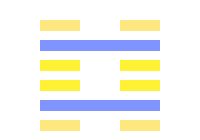
29.2.3.4.5 (29 > 62) - THE KHAN HEXAGRAM.
- 2. The second line, undivided, shows its subject in all the peril of the defile. He will, however, get a little (of the deliverance) that he seeks.
- 3. The third line, divided, shows its subject, whether he comes or goes ( = descends or ascends), confronted by a defile. All is peril to him and unrest. (His endeavours) will lead him into the cavern of the pit. There should be no action (in such a case).
- 4. The fourth line, divided, shows its subject (at a feast), with (simply) a bottle of spirits, and a subsidiary basket of rice, while (the cups and bowls) are (only) of earthenware. He introduces his important lessons (as his ruler's) intelligence admits. There will in the end be no error.
- 5. The fifth line, undivided, shows the water of the defile not yet full, (so that it might flow away) ; but order will (soon) be brought about. There will be no error.
29.2.3.4.5 (29 > 62) - Visiting one last time
One sees one's friends again to say farewell.
Bing DeepL Google Yandex29.2.3.4.5 (29 > 62) - Visiting one last time
One sees one's friends again to say farewell.
Bing DeepL Google Yandex29.2.3.4.5 (29 > 62) - K’ân, l’abîme
K’ān : danger, précipice, caverne. — Tsa k’ān : courir de grands risques ; s’exposer au danger pour un autre.
-
2. Dans les écueils périlleux, si on sait modérer ses sentiments, on pourra en sortir heureusement.
Si on garde la modération. - 3. Si en tout et partout on ne rencontre que danger, que les périls, les sujets de crainte s’accumulent, alors dans un tel danger, il n’y a plus d’expédient qui puisse servir. — Il n’y aura plus de secours possible.
- 4. Si l’on offre des sacrifices avec simplicité (sans ostentation), avec un vase de spiritueux et une corbeille de grains, tandis que les assistants n’ont que des vases de terre, si par cette modération on se forme à la vertu, alors qu’on aurait d’abord des difficultés et des écueils, on deviendra irréprochable. (Moyen d’éviter les dangers.)
- 5. Mais si le danger n’est pas inéluctable, si une caverne où l’on se trouve n’est point pleine d’eau et qu’on puisse encore aplanir le terrain, on en sortira sans faute. — Il n’arrivera pas malheur.
29.2.3.4.5 (29 > 62) - Rendre visite une dernière fois
On revoit ses amis pour leur dire adieu.
Bing DeepL Google Yandex29.2.3.4.5 (29 > 62) - Mélység
- 2. Ha valaki túl nagy nehézségekkel kerül szembe, rá kell hagynia olyanokra akik tudják kezelni azokat.
- 3. Látják amit elrontott így odébbáll.
- 4. Ha valaki eszközök híján van, meg kell elégednie egyszerű dolgokkal.
- 5. Mielőtt visszatérne hogy segítsen másokon, szünetet kell tartania és fel kell készülnie hogy válaszoljon a közelállóknak.
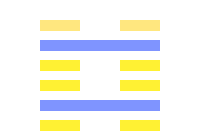
29.1.2.3.4.5 (29 > 55) - THE KHAN HEXAGRAM.
- 1. The first line, divided, shows its subject in the double defile, and (yet) entering a cavern within it. There will be evil.
- 2. The second line, undivided, shows its subject in all the peril of the defile. He will, however, get a little (of the deliverance) that he seeks.
- 3. The third line, divided, shows its subject, whether he comes or goes ( = descends or ascends), confronted by a defile. All is peril to him and unrest. (His endeavours) will lead him into the cavern of the pit. There should be no action (in such a case).
- 4. The fourth line, divided, shows its subject (at a feast), with (simply) a bottle of spirits, and a subsidiary basket of rice, while (the cups and bowls) are (only) of earthenware. He introduces his important lessons (as his ruler's) intelligence admits. There will in the end be no error.
- 5. The fifth line, undivided, shows the water of the defile not yet full, (so that it might flow away) ; but order will (soon) be brought about. There will be no error.
29.1.2.3.4.5 (29 > 55) - Spreading discomfort
One disturbs others by talking to them about disgusting things.
29.1.2.3.4.5 (29 > 55) - Spreading discomfort
One disturbs others by talking to them about disgusting things.
29.1.2.3.4.5 (29 > 55) - K’ân, l’abîme
K’ān : danger, précipice, caverne. — Tsa k’ān : courir de grands risques ; s’exposer au danger pour un autre.
- 1. Courir des dangers, comme entrer dans une caverne d’un défilé dangereux, est chose redoutable.
-
2. Dans les écueils périlleux, si on sait modérer ses sentiments, on pourra en sortir heureusement.
Si on garde la modération. - 3. Si en tout et partout on ne rencontre que danger, que les périls, les sujets de crainte s’accumulent, alors dans un tel danger, il n’y a plus d’expédient qui puisse servir. — Il n’y aura plus de secours possible.
- 4. Si l’on offre des sacrifices avec simplicité (sans ostentation), avec un vase de spiritueux et une corbeille de grains, tandis que les assistants n’ont que des vases de terre, si par cette modération on se forme à la vertu, alors qu’on aurait d’abord des difficultés et des écueils, on deviendra irréprochable. (Moyen d’éviter les dangers.)
- 5. Mais si le danger n’est pas inéluctable, si une caverne où l’on se trouve n’est point pleine d’eau et qu’on puisse encore aplanir le terrain, on en sortira sans faute. — Il n’arrivera pas malheur.
29.1.2.3.4.5 (29 > 55) - Répandre la gêne
On perturbe les autres en leur parlant de choses dégoûtantes.
Bing DeepL Google Yandex29.1.2.3.4.5 (29 > 55) - Mélység
- 1. Ha egy nehézséggel találkozott, meg kell oldania mielőtt elkezdene foglalkozni egy másikkal.
- 2. Ha valaki túl nagy nehézségekkel kerül szembe, rá kell hagynia olyanokra akik tudják kezelni azokat.
- 3. Látják amit elrontott így odébbáll.
- 4. Ha valaki eszközök híján van, meg kell elégednie egyszerű dolgokkal.
- 5. Mielőtt visszatérne hogy segítsen másokon, szünetet kell tartania és fel kell készülnie hogy válaszoljon a közelállóknak.

29.6 (29 > 59) - THE KHAN HEXAGRAM.
The topmost line, divided, shows its subject bound with cords of three strands or two strands, and placed in the thicket of thorns. But in three years he does not learn the course for him to pursue. There will be evil.
Bing DeepL Google Yandex29.6 (29 > 59) - Pausing
When it is too tiring, one can stop and resume later.
Bing DeepL Google Yandex29.6 (29 > 59) - Pausing
When it is too tiring, one can stop and resume later.
Bing DeepL Google Yandex29.6 (29 > 59) - K’ân, l’abîme
K’ān : danger, précipice, caverne. — Tsa k’ān : courir de grands risques ; s’exposer au danger pour un autre.
Danger de celui qui, lié, vinculé de triples liens, enfermé dans un cachot, ne peut de longtemps parvenir à se délivrer. Sort funeste ! — Tel est celui qui a perdu la voie de la sagesse
Bing DeepL Google Yandex29.6 (29 > 59) - Mettre en pause
Quand c'est trop fatiguant, on peut s'arrêter et reprendre plus tard.
Bing DeepL Google Yandex29.6 (29 > 59) - Mélység
Ha túl fáradt, meg kell állnia és később folytatnia.
Bing DeepL Google Yandex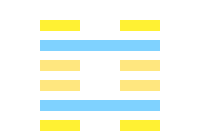
29.1.6 (29 > 61) - THE KHAN HEXAGRAM.
- 1. The first line, divided, shows its subject in the double defile, and (yet) entering a cavern within it. There will be evil.
- 6. The topmost line, divided, shows its subject bound with cords of three strands or two strands, and placed in the thicket of thorns. But in three years he does not learn the course for him to pursue. There will be evil.
29.1.6 (29 > 61) - Forcing oneself to smile
One stops making a bad face before the others leave.
Bing DeepL Google Yandex29.1.6 (29 > 61) - Forcing oneself to smile
One stops making a bad face before the others leave.
Bing DeepL Google Yandex29.1.6 (29 > 61) - K’ân, l’abîme
K’ān : danger, précipice, caverne. — Tsa k’ān : courir de grands risques ; s’exposer au danger pour un autre.
- 1. Courir des dangers, comme entrer dans une caverne d’un défilé dangereux, est chose redoutable.
- 6. Danger de celui qui, lié, vinculé de triples liens, enfermé dans un cachot, ne peut de longtemps parvenir à se délivrer. Sort funeste ! — Tel est celui qui a perdu la voie de la sagesse
29.1.6 (29 > 61) - Se forcer à sourire
On arrête de faire sa mauvaise tête avant que les autres ne partent.
Bing DeepL Google Yandex29.1.6 (29 > 61) - Mélység
- 1. Ha egy nehézséggel találkozott, meg kell oldania mielőtt elkezdene foglalkozni egy másikkal.
- 6. Ha túl fáradt, meg kell állnia és később folytatnia.

29.2.6 (29 > 20) - THE KHAN HEXAGRAM.
- 2. The second line, undivided, shows its subject in all the peril of the defile. He will, however, get a little (of the deliverance) that he seeks.
- 6. The topmost line, divided, shows its subject bound with cords of three strands or two strands, and placed in the thicket of thorns. But in three years he does not learn the course for him to pursue. There will be evil.
29.2.6 (29 > 20) - Listening to those who know
One acclimatises oneself by being flexible.
Bing DeepL Google Yandex29.2.6 (29 > 20) - Listening to those who know
One acclimatizes oneself by being flexible.
Bing DeepL Google Yandex29.2.6 (29 > 20) - K’ân, l’abîme
K’ān : danger, précipice, caverne. — Tsa k’ān : courir de grands risques ; s’exposer au danger pour un autre.
-
2. Dans les écueils périlleux, si on sait modérer ses sentiments, on pourra en sortir heureusement.
Si on garde la modération. - 6. Danger de celui qui, lié, vinculé de triples liens, enfermé dans un cachot, ne peut de longtemps parvenir à se délivrer. Sort funeste ! — Tel est celui qui a perdu la voie de la sagesse
29.2.6 (29 > 20) - Être à l'écoute de ceux qui savent
On s'acclimate en faisant preuve de souplesse.
Bing DeepL Google Yandex29.2.6 (29 > 20) - Mélység
- 2. Ha valaki túl nagy nehézségekkel kerül szembe, rá kell hagynia olyanokra akik tudják kezelni azokat.
- 6. Ha túl fáradt, meg kell állnia és később folytatnia.

29.1.2.6 (29 > 42) - THE KHAN HEXAGRAM.
- 1. The first line, divided, shows its subject in the double defile, and (yet) entering a cavern within it. There will be evil.
- 2. The second line, undivided, shows its subject in all the peril of the defile. He will, however, get a little (of the deliverance) that he seeks.
- 6. The topmost line, divided, shows its subject bound with cords of three strands or two strands, and placed in the thicket of thorns. But in three years he does not learn the course for him to pursue. There will be evil.
29.1.2.6 (29 > 42) - Demanding the finest of work
One recruits assistants to do delicate work.
Bing DeepL Google Yandex29.1.2.6 (29 > 42) - Demanding the finest of work
One recruits assistants to do delicate work.
Bing DeepL Google Yandex29.1.2.6 (29 > 42) - K’ân, l’abîme
K’ān : danger, précipice, caverne. — Tsa k’ān : courir de grands risques ; s’exposer au danger pour un autre.
- 1. Courir des dangers, comme entrer dans une caverne d’un défilé dangereux, est chose redoutable.
-
2. Dans les écueils périlleux, si on sait modérer ses sentiments, on pourra en sortir heureusement.
Si on garde la modération. - 6. Danger de celui qui, lié, vinculé de triples liens, enfermé dans un cachot, ne peut de longtemps parvenir à se délivrer. Sort funeste ! — Tel est celui qui a perdu la voie de la sagesse
29.1.2.6 (29 > 42) - Réclamer un travail soigné
On recrute des assistants pour faire des travaux délicats.
Bing DeepL Google Yandex29.1.2.6 (29 > 42) - Mélység
- 1. Ha egy nehézséggel találkozott, meg kell oldania mielőtt elkezdene foglalkozni egy másikkal.
- 2. Ha valaki túl nagy nehézségekkel kerül szembe, rá kell hagynia olyanokra akik tudják kezelni azokat.
- 6. Ha túl fáradt, meg kell állnia és később folytatnia.
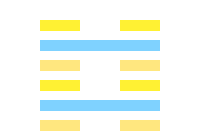
29.3.6 (29 > 57) - THE KHAN HEXAGRAM.
- 3. The third line, divided, shows its subject, whether he comes or goes ( = descends or ascends), confronted by a defile. All is peril to him and unrest. (His endeavours) will lead him into the cavern of the pit. There should be no action (in such a case).
- 6. The topmost line, divided, shows its subject bound with cords of three strands or two strands, and placed in the thicket of thorns. But in three years he does not learn the course for him to pursue. There will be evil.
29.3.6 (29 > 57) - Lifting the siege
One retreats before the strength of the resistance from the other side.
Bing DeepL Google Yandex29.3.6 (29 > 57) - Lifting the siege
One retreats before the strength of the resistance from the other side.
Bing DeepL Google Yandex29.3.6 (29 > 57) - K’ân, l’abîme
K’ān : danger, précipice, caverne. — Tsa k’ān : courir de grands risques ; s’exposer au danger pour un autre.
- 3. Si en tout et partout on ne rencontre que danger, que les périls, les sujets de crainte s’accumulent, alors dans un tel danger, il n’y a plus d’expédient qui puisse servir. — Il n’y aura plus de secours possible.
- 6. Danger de celui qui, lié, vinculé de triples liens, enfermé dans un cachot, ne peut de longtemps parvenir à se délivrer. Sort funeste ! — Tel est celui qui a perdu la voie de la sagesse
29.3.6 (29 > 57) - Lever le siège
On recule devant la vigueur de la résistance d'en face.
Bing DeepL Google Yandex29.3.6 (29 > 57) - Mélység
- 3. Látják amit elrontott így odébbáll.
- 6. Ha túl fáradt, meg kell állnia és később folytatnia.
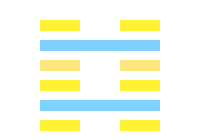
29.1.3.6 (29 > 9) - THE KHAN HEXAGRAM.
- 1. The first line, divided, shows its subject in the double defile, and (yet) entering a cavern within it. There will be evil.
- 3. The third line, divided, shows its subject, whether he comes or goes ( = descends or ascends), confronted by a defile. All is peril to him and unrest. (His endeavours) will lead him into the cavern of the pit. There should be no action (in such a case).
- 6. The topmost line, divided, shows its subject bound with cords of three strands or two strands, and placed in the thicket of thorns. But in three years he does not learn the course for him to pursue. There will be evil.
29.1.3.6 (29 > 9) - Sitting idle
One spends one's time looking at what's wrong instead of fixing it
Bing DeepL Google Yandex29.1.3.6 (29 > 9) - Sitting idle
One spends one's time looking at what's wrong instead of fixing it
Bing DeepL Google Yandex29.1.3.6 (29 > 9) - K’ân, l’abîme
K’ān : danger, précipice, caverne. — Tsa k’ān : courir de grands risques ; s’exposer au danger pour un autre.
- 1. Courir des dangers, comme entrer dans une caverne d’un défilé dangereux, est chose redoutable.
- 3. Si en tout et partout on ne rencontre que danger, que les périls, les sujets de crainte s’accumulent, alors dans un tel danger, il n’y a plus d’expédient qui puisse servir. — Il n’y aura plus de secours possible.
- 6. Danger de celui qui, lié, vinculé de triples liens, enfermé dans un cachot, ne peut de longtemps parvenir à se délivrer. Sort funeste ! — Tel est celui qui a perdu la voie de la sagesse
29.1.3.6 (29 > 9) - Rester les bras croisés
On passe son temps à regarder ce qui ne va pas au lieu d'y remédier.
Bing DeepL Google Yandex29.1.3.6 (29 > 9) - Mélység
- 1. Ha egy nehézséggel találkozott, meg kell oldania mielőtt elkezdene foglalkozni egy másikkal.
- 3. Látják amit elrontott így odébbáll.
- 6. Ha túl fáradt, meg kell állnia és később folytatnia.

29.2.3.6 (29 > 53) - THE KHAN HEXAGRAM.
- 2. The second line, undivided, shows its subject in all the peril of the defile. He will, however, get a little (of the deliverance) that he seeks.
- 3. The third line, divided, shows its subject, whether he comes or goes ( = descends or ascends), confronted by a defile. All is peril to him and unrest. (His endeavours) will lead him into the cavern of the pit. There should be no action (in such a case).
- 6. The topmost line, divided, shows its subject bound with cords of three strands or two strands, and placed in the thicket of thorns. But in three years he does not learn the course for him to pursue. There will be evil.
29.2.3.6 (29 > 53) - Taking drastic action
One performs surgery without anesthesia.
Bing DeepL Google Yandex29.2.3.6 (29 > 53) - Taking drastic action
One performs surgery without anesthesia.
Bing DeepL Google Yandex29.2.3.6 (29 > 53) - K’ân, l’abîme
K’ān : danger, précipice, caverne. — Tsa k’ān : courir de grands risques ; s’exposer au danger pour un autre.
-
2. Dans les écueils périlleux, si on sait modérer ses sentiments, on pourra en sortir heureusement.
Si on garde la modération. - 3. Si en tout et partout on ne rencontre que danger, que les périls, les sujets de crainte s’accumulent, alors dans un tel danger, il n’y a plus d’expédient qui puisse servir. — Il n’y aura plus de secours possible.
- 6. Danger de celui qui, lié, vinculé de triples liens, enfermé dans un cachot, ne peut de longtemps parvenir à se délivrer. Sort funeste ! — Tel est celui qui a perdu la voie de la sagesse
29.2.3.6 (29 > 53) - Trancher dans le vif
On pratique une opération sans anesthésie.
Bing DeepL Google Yandex29.2.3.6 (29 > 53) - Mélység
- 2. Ha valaki túl nagy nehézségekkel kerül szembe, rá kell hagynia olyanokra akik tudják kezelni azokat.
- 3. Látják amit elrontott így odébbáll.
- 6. Ha túl fáradt, meg kell állnia és később folytatnia.

29.1.2.3.6 (29 > 37) - THE KHAN HEXAGRAM.
- 1. The first line, divided, shows its subject in the double defile, and (yet) entering a cavern within it. There will be evil.
- 2. The second line, undivided, shows its subject in all the peril of the defile. He will, however, get a little (of the deliverance) that he seeks.
- 3. The third line, divided, shows its subject, whether he comes or goes ( = descends or ascends), confronted by a defile. All is peril to him and unrest. (His endeavours) will lead him into the cavern of the pit. There should be no action (in such a case).
- 6. The topmost line, divided, shows its subject bound with cords of three strands or two strands, and placed in the thicket of thorns. But in three years he does not learn the course for him to pursue. There will be evil.
29.1.2.3.6 (29 > 37) - Rallying those who have been deceived
One recruits allies from among those who have been betrayed.
Bing DeepL Google Yandex29.1.2.3.6 (29 > 37) - Rallying those who have been deceived
One recruits allies from among those who have been betrayed.
Bing DeepL Google Yandex29.1.2.3.6 (29 > 37) - K’ân, l’abîme
K’ān : danger, précipice, caverne. — Tsa k’ān : courir de grands risques ; s’exposer au danger pour un autre.
- 1. Courir des dangers, comme entrer dans une caverne d’un défilé dangereux, est chose redoutable.
-
2. Dans les écueils périlleux, si on sait modérer ses sentiments, on pourra en sortir heureusement.
Si on garde la modération. - 3. Si en tout et partout on ne rencontre que danger, que les périls, les sujets de crainte s’accumulent, alors dans un tel danger, il n’y a plus d’expédient qui puisse servir. — Il n’y aura plus de secours possible.
- 6. Danger de celui qui, lié, vinculé de triples liens, enfermé dans un cachot, ne peut de longtemps parvenir à se délivrer. Sort funeste ! — Tel est celui qui a perdu la voie de la sagesse
29.1.2.3.6 (29 > 37) - Rallier ceux qui ont été trompés
On recrute des alliés parmi ceux qui ont été trahis.
Bing DeepL Google Yandex29.1.2.3.6 (29 > 37) - Mélység
- 1. Ha egy nehézséggel találkozott, meg kell oldania mielőtt elkezdene foglalkozni egy másikkal.
- 2. Ha valaki túl nagy nehézségekkel kerül szembe, rá kell hagynia olyanokra akik tudják kezelni azokat.
- 3. Látják amit elrontott így odébbáll.
- 6. Ha túl fáradt, meg kell állnia és később folytatnia.

29.4.6 (29 > 6) - THE KHAN HEXAGRAM.
- 4. The fourth line, divided, shows its subject (at a feast), with (simply) a bottle of spirits, and a subsidiary basket of rice, while (the cups and bowls) are (only) of earthenware. He introduces his important lessons (as his ruler's) intelligence admits. There will in the end be no error.
- 6. The topmost line, divided, shows its subject bound with cords of three strands or two strands, and placed in the thicket of thorns. But in three years he does not learn the course for him to pursue. There will be evil.
29.4.6 (29 > 6) - Reducing difficulties
It was agreed to simplify the decisions to be taken.
Bing DeepL Google Yandex29.4.6 (29 > 6) - Reducing difficulties
It was agreed to simplify the decisions to be taken.
Bing DeepL Google Yandex29.4.6 (29 > 6) - K’ân, l’abîme
K’ān : danger, précipice, caverne. — Tsa k’ān : courir de grands risques ; s’exposer au danger pour un autre.
- 4. Si l’on offre des sacrifices avec simplicité (sans ostentation), avec un vase de spiritueux et une corbeille de grains, tandis que les assistants n’ont que des vases de terre, si par cette modération on se forme à la vertu, alors qu’on aurait d’abord des difficultés et des écueils, on deviendra irréprochable. (Moyen d’éviter les dangers.)
- 6. Danger de celui qui, lié, vinculé de triples liens, enfermé dans un cachot, ne peut de longtemps parvenir à se délivrer. Sort funeste ! — Tel est celui qui a perdu la voie de la sagesse
29.4.6 (29 > 6) - Réduire les difficultés
On s'accorde pour simplifier les décisions à prendre.
Bing DeepL Google Yandex29.4.6 (29 > 6) - Mélység
- 4. Ha valaki eszközök híján van, meg kell elégednie egyszerű dolgokkal.
- 6. Ha túl fáradt, meg kell állnia és később folytatnia.

29.1.4.6 (29 > 10) - THE KHAN HEXAGRAM.
- 1. The first line, divided, shows its subject in the double defile, and (yet) entering a cavern within it. There will be evil.
- 4. The fourth line, divided, shows its subject (at a feast), with (simply) a bottle of spirits, and a subsidiary basket of rice, while (the cups and bowls) are (only) of earthenware. He introduces his important lessons (as his ruler's) intelligence admits. There will in the end be no error.
- 6. The topmost line, divided, shows its subject bound with cords of three strands or two strands, and placed in the thicket of thorns. But in three years he does not learn the course for him to pursue. There will be evil.
29.1.4.6 (29 > 10) - Not wanting any more scandal
One appreciates that others did not come to cause more trouble.
Bing DeepL Google Yandex29.1.4.6 (29 > 10) - Not wanting any more scandal
One appreciates that others did not come to cause more trouble.
Bing DeepL Google Yandex29.1.4.6 (29 > 10) - K’ân, l’abîme
K’ān : danger, précipice, caverne. — Tsa k’ān : courir de grands risques ; s’exposer au danger pour un autre.
- 1. Courir des dangers, comme entrer dans une caverne d’un défilé dangereux, est chose redoutable.
- 4. Si l’on offre des sacrifices avec simplicité (sans ostentation), avec un vase de spiritueux et une corbeille de grains, tandis que les assistants n’ont que des vases de terre, si par cette modération on se forme à la vertu, alors qu’on aurait d’abord des difficultés et des écueils, on deviendra irréprochable. (Moyen d’éviter les dangers.)
- 6. Danger de celui qui, lié, vinculé de triples liens, enfermé dans un cachot, ne peut de longtemps parvenir à se délivrer. Sort funeste ! — Tel est celui qui a perdu la voie de la sagesse
29.1.4.6 (29 > 10) - Ne plus vouloir scandales
On apprécie que les autres ne soient pas venus pour causer davantage de soucis.
Bing DeepL Google Yandex29.1.4.6 (29 > 10) - Mélység
- 1. Ha egy nehézséggel találkozott, meg kell oldania mielőtt elkezdene foglalkozni egy másikkal.
- 4. Ha valaki eszközök híján van, meg kell elégednie egyszerű dolgokkal.
- 6. Ha túl fáradt, meg kell állnia és később folytatnia.

29.2.4.6 (29 > 12) - THE KHAN HEXAGRAM.
- 2. The second line, undivided, shows its subject in all the peril of the defile. He will, however, get a little (of the deliverance) that he seeks.
- 4. The fourth line, divided, shows its subject (at a feast), with (simply) a bottle of spirits, and a subsidiary basket of rice, while (the cups and bowls) are (only) of earthenware. He introduces his important lessons (as his ruler's) intelligence admits. There will in the end be no error.
- 6. The topmost line, divided, shows its subject bound with cords of three strands or two strands, and placed in the thicket of thorns. But in three years he does not learn the course for him to pursue. There will be evil.
29.2.4.6 (29 > 12) - Moving from Charybdis to Scylla
One is facing difficulties that will continue to grow.
Bing DeepL Google Yandex29.2.4.6 (29 > 12) - Moving from Charybdis to Scylla
One is facing difficulties that will continue to grow.
Bing DeepL Google Yandex29.2.4.6 (29 > 12) - K’ân, l’abîme
K’ān : danger, précipice, caverne. — Tsa k’ān : courir de grands risques ; s’exposer au danger pour un autre.
-
2. Dans les écueils périlleux, si on sait modérer ses sentiments, on pourra en sortir heureusement.
Si on garde la modération. - 4. Si l’on offre des sacrifices avec simplicité (sans ostentation), avec un vase de spiritueux et une corbeille de grains, tandis que les assistants n’ont que des vases de terre, si par cette modération on se forme à la vertu, alors qu’on aurait d’abord des difficultés et des écueils, on deviendra irréprochable. (Moyen d’éviter les dangers.)
- 6. Danger de celui qui, lié, vinculé de triples liens, enfermé dans un cachot, ne peut de longtemps parvenir à se délivrer. Sort funeste ! — Tel est celui qui a perdu la voie de la sagesse
29.2.4.6 (29 > 12) - Aller de Charybde en Scylla
On est confronté à des difficultés qui vont aller crescendo.
Bing DeepL Google Yandex29.2.4.6 (29 > 12) - Mélység
- 2. Ha valaki túl nagy nehézségekkel kerül szembe, rá kell hagynia olyanokra akik tudják kezelni azokat.
- 4. Ha valaki eszközök híján van, meg kell elégednie egyszerű dolgokkal.
- 6. Ha túl fáradt, meg kell állnia és később folytatnia.

29.1.2.4.6 (29 > 25) - THE KHAN HEXAGRAM.
- 1. The first line, divided, shows its subject in the double defile, and (yet) entering a cavern within it. There will be evil.
- 2. The second line, undivided, shows its subject in all the peril of the defile. He will, however, get a little (of the deliverance) that he seeks.
- 4. The fourth line, divided, shows its subject (at a feast), with (simply) a bottle of spirits, and a subsidiary basket of rice, while (the cups and bowls) are (only) of earthenware. He introduces his important lessons (as his ruler's) intelligence admits. There will in the end be no error.
- 6. The topmost line, divided, shows its subject bound with cords of three strands or two strands, and placed in the thicket of thorns. But in three years he does not learn the course for him to pursue. There will be evil.
29.1.2.4.6 (29 > 25) - Forcing sympathy
One compels one's friends by posing as a victim.
Bing DeepL Google Yandex29.1.2.4.6 (29 > 25) - Forcing sympathy
One compels one's friends by posing as a victim.
Bing DeepL Google Yandex29.1.2.4.6 (29 > 25) - K’ân, l’abîme
K’ān : danger, précipice, caverne. — Tsa k’ān : courir de grands risques ; s’exposer au danger pour un autre.
- 1. Courir des dangers, comme entrer dans une caverne d’un défilé dangereux, est chose redoutable.
-
2. Dans les écueils périlleux, si on sait modérer ses sentiments, on pourra en sortir heureusement.
Si on garde la modération. - 4. Si l’on offre des sacrifices avec simplicité (sans ostentation), avec un vase de spiritueux et une corbeille de grains, tandis que les assistants n’ont que des vases de terre, si par cette modération on se forme à la vertu, alors qu’on aurait d’abord des difficultés et des écueils, on deviendra irréprochable. (Moyen d’éviter les dangers.)
- 6. Danger de celui qui, lié, vinculé de triples liens, enfermé dans un cachot, ne peut de longtemps parvenir à se délivrer. Sort funeste ! — Tel est celui qui a perdu la voie de la sagesse
29.1.2.4.6 (29 > 25) - Forcer la sympathie
On oblige ses amis en se posant en victime.
Bing DeepL Google Yandex29.1.2.4.6 (29 > 25) - Mélység
- 1. Ha egy nehézséggel találkozott, meg kell oldania mielőtt elkezdene foglalkozni egy másikkal.
- 2. Ha valaki túl nagy nehézségekkel kerül szembe, rá kell hagynia olyanokra akik tudják kezelni azokat.
- 4. Ha valaki eszközök híján van, meg kell elégednie egyszerű dolgokkal.
- 6. Ha túl fáradt, meg kell állnia és később folytatnia.
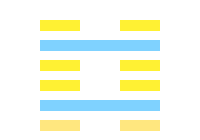
29.3.4.6 (29 > 44) - THE KHAN HEXAGRAM.
- 3. The third line, divided, shows its subject, whether he comes or goes ( = descends or ascends), confronted by a defile. All is peril to him and unrest. (His endeavours) will lead him into the cavern of the pit. There should be no action (in such a case).
- 4. The fourth line, divided, shows its subject (at a feast), with (simply) a bottle of spirits, and a subsidiary basket of rice, while (the cups and bowls) are (only) of earthenware. He introduces his important lessons (as his ruler's) intelligence admits. There will in the end be no error.
- 6. The topmost line, divided, shows its subject bound with cords of three strands or two strands, and placed in the thicket of thorns. But in three years he does not learn the course for him to pursue. There will be evil.
29.3.4.6 (29 > 44) - Remembering good memories
One watches again with passion a film that one has enjoyed so much.
Bing DeepL Google Yandex29.3.4.6 (29 > 44) - Remembering good memories
One watches again with passion a film that one has enjoyed so much.
Bing DeepL Google Yandex29.3.4.6 (29 > 44) - K’ân, l’abîme
K’ān : danger, précipice, caverne. — Tsa k’ān : courir de grands risques ; s’exposer au danger pour un autre.
- 3. Si en tout et partout on ne rencontre que danger, que les périls, les sujets de crainte s’accumulent, alors dans un tel danger, il n’y a plus d’expédient qui puisse servir. — Il n’y aura plus de secours possible.
- 4. Si l’on offre des sacrifices avec simplicité (sans ostentation), avec un vase de spiritueux et une corbeille de grains, tandis que les assistants n’ont que des vases de terre, si par cette modération on se forme à la vertu, alors qu’on aurait d’abord des difficultés et des écueils, on deviendra irréprochable. (Moyen d’éviter les dangers.)
- 6. Danger de celui qui, lié, vinculé de triples liens, enfermé dans un cachot, ne peut de longtemps parvenir à se délivrer. Sort funeste ! — Tel est celui qui a perdu la voie de la sagesse
29.3.4.6 (29 > 44) - Se rappeler de bons souvenirs
On revoit avec passion un film qu'on a tant apprécié.
Bing DeepL Google Yandex29.3.4.6 (29 > 44) - Mélység
- 3. Látják amit elrontott így odébbáll.
- 4. Ha valaki eszközök híján van, meg kell elégednie egyszerű dolgokkal.
- 6. Ha túl fáradt, meg kell állnia és később folytatnia.
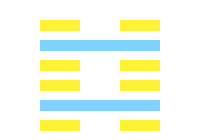
29.1.3.4.6 (29 > 1) - THE KHAN HEXAGRAM.
- 1. The first line, divided, shows its subject in the double defile, and (yet) entering a cavern within it. There will be evil.
- 3. The third line, divided, shows its subject, whether he comes or goes ( = descends or ascends), confronted by a defile. All is peril to him and unrest. (His endeavours) will lead him into the cavern of the pit. There should be no action (in such a case).
- 4. The fourth line, divided, shows its subject (at a feast), with (simply) a bottle of spirits, and a subsidiary basket of rice, while (the cups and bowls) are (only) of earthenware. He introduces his important lessons (as his ruler's) intelligence admits. There will in the end be no error.
- 6. The topmost line, divided, shows its subject bound with cords of three strands or two strands, and placed in the thicket of thorns. But in three years he does not learn the course for him to pursue. There will be evil.
29.1.3.4.6 (29 > 1) - Asking for everyone's approval
One thinks one can make one's choices accepted by others.
Bing DeepL Google Yandex29.1.3.4.6 (29 > 1) - Asking for everyone's approval
One thinks one can make one's choices accepted by others.
Bing DeepL Google Yandex29.1.3.4.6 (29 > 1) - K’ân, l’abîme
K’ān : danger, précipice, caverne. — Tsa k’ān : courir de grands risques ; s’exposer au danger pour un autre.
- 1. Courir des dangers, comme entrer dans une caverne d’un défilé dangereux, est chose redoutable.
- 3. Si en tout et partout on ne rencontre que danger, que les périls, les sujets de crainte s’accumulent, alors dans un tel danger, il n’y a plus d’expédient qui puisse servir. — Il n’y aura plus de secours possible.
- 4. Si l’on offre des sacrifices avec simplicité (sans ostentation), avec un vase de spiritueux et une corbeille de grains, tandis que les assistants n’ont que des vases de terre, si par cette modération on se forme à la vertu, alors qu’on aurait d’abord des difficultés et des écueils, on deviendra irréprochable. (Moyen d’éviter les dangers.)
- 6. Danger de celui qui, lié, vinculé de triples liens, enfermé dans un cachot, ne peut de longtemps parvenir à se délivrer. Sort funeste ! — Tel est celui qui a perdu la voie de la sagesse
29.1.3.4.6 (29 > 1) - Demander l'approbation de tous
On pense pouvoir faire accepter ses choix par les autres.
Bing DeepL Google Yandex29.1.3.4.6 (29 > 1) - Mélység
- 1. Ha egy nehézséggel találkozott, meg kell oldania mielőtt elkezdene foglalkozni egy másikkal.
- 3. Látják amit elrontott így odébbáll.
- 4. Ha valaki eszközök híján van, meg kell elégednie egyszerű dolgokkal.
- 6. Ha túl fáradt, meg kell állnia és később folytatnia.

29.2.3.4.6 (29 > 33) - THE KHAN HEXAGRAM.
- 2. The second line, undivided, shows its subject in all the peril of the defile. He will, however, get a little (of the deliverance) that he seeks.
- 3. The third line, divided, shows its subject, whether he comes or goes ( = descends or ascends), confronted by a defile. All is peril to him and unrest. (His endeavours) will lead him into the cavern of the pit. There should be no action (in such a case).
- 4. The fourth line, divided, shows its subject (at a feast), with (simply) a bottle of spirits, and a subsidiary basket of rice, while (the cups and bowls) are (only) of earthenware. He introduces his important lessons (as his ruler's) intelligence admits. There will in the end be no error.
- 6. The topmost line, divided, shows its subject bound with cords of three strands or two strands, and placed in the thicket of thorns. But in three years he does not learn the course for him to pursue. There will be evil.
29.2.3.4.6 (29 > 33) - Ignoring criticism
When one treats one's opponents with contempt, one takes the risk of being besieged.
Bing DeepL Google Yandex29.2.3.4.6 (29 > 33) - Ignoring criticism
When one treats one's opponents with contempt, one takes the risk of being besieged.
Bing DeepL Google Yandex29.2.3.4.6 (29 > 33) - K’ân, l’abîme
K’ān : danger, précipice, caverne. — Tsa k’ān : courir de grands risques ; s’exposer au danger pour un autre.
-
2. Dans les écueils périlleux, si on sait modérer ses sentiments, on pourra en sortir heureusement.
Si on garde la modération. - 3. Si en tout et partout on ne rencontre que danger, que les périls, les sujets de crainte s’accumulent, alors dans un tel danger, il n’y a plus d’expédient qui puisse servir. — Il n’y aura plus de secours possible.
- 4. Si l’on offre des sacrifices avec simplicité (sans ostentation), avec un vase de spiritueux et une corbeille de grains, tandis que les assistants n’ont que des vases de terre, si par cette modération on se forme à la vertu, alors qu’on aurait d’abord des difficultés et des écueils, on deviendra irréprochable. (Moyen d’éviter les dangers.)
- 6. Danger de celui qui, lié, vinculé de triples liens, enfermé dans un cachot, ne peut de longtemps parvenir à se délivrer. Sort funeste ! — Tel est celui qui a perdu la voie de la sagesse
29.2.3.4.6 (29 > 33) - Ignorer les critiques
Quand on traite ses adversaires avec mépris, on prend le risque de se faire assiéger.
Bing DeepL Google Yandex29.2.3.4.6 (29 > 33) - Mélység
- 2. Ha valaki túl nagy nehézségekkel kerül szembe, rá kell hagynia olyanokra akik tudják kezelni azokat.
- 3. Látják amit elrontott így odébbáll.
- 4. Ha valaki eszközök híján van, meg kell elégednie egyszerű dolgokkal.
- 6. Ha túl fáradt, meg kell állnia és később folytatnia.

29.1.2.3.4.6 (29 > 13) - THE KHAN HEXAGRAM.
- 1. The first line, divided, shows its subject in the double defile, and (yet) entering a cavern within it. There will be evil.
- 2. The second line, undivided, shows its subject in all the peril of the defile. He will, however, get a little (of the deliverance) that he seeks.
- 3. The third line, divided, shows its subject, whether he comes or goes ( = descends or ascends), confronted by a defile. All is peril to him and unrest. (His endeavours) will lead him into the cavern of the pit. There should be no action (in such a case).
- 4. The fourth line, divided, shows its subject (at a feast), with (simply) a bottle of spirits, and a subsidiary basket of rice, while (the cups and bowls) are (only) of earthenware. He introduces his important lessons (as his ruler's) intelligence admits. There will in the end be no error.
- 6. The topmost line, divided, shows its subject bound with cords of three strands or two strands, and placed in the thicket of thorns. But in three years he does not learn the course for him to pursue. There will be evil.
29.1.2.3.4.6 (29 > 13) - Venting off
One is aware of the need to tell others what is wrong.
Bing DeepL Google Yandex29.1.2.3.4.6 (29 > 13) - Venting off
One is aware of the need to tell others what is wrong.
Bing DeepL Google Yandex29.1.2.3.4.6 (29 > 13) - K’ân, l’abîme
K’ān : danger, précipice, caverne. — Tsa k’ān : courir de grands risques ; s’exposer au danger pour un autre.
- 1. Courir des dangers, comme entrer dans une caverne d’un défilé dangereux, est chose redoutable.
-
2. Dans les écueils périlleux, si on sait modérer ses sentiments, on pourra en sortir heureusement.
Si on garde la modération. - 3. Si en tout et partout on ne rencontre que danger, que les périls, les sujets de crainte s’accumulent, alors dans un tel danger, il n’y a plus d’expédient qui puisse servir. — Il n’y aura plus de secours possible.
- 4. Si l’on offre des sacrifices avec simplicité (sans ostentation), avec un vase de spiritueux et une corbeille de grains, tandis que les assistants n’ont que des vases de terre, si par cette modération on se forme à la vertu, alors qu’on aurait d’abord des difficultés et des écueils, on deviendra irréprochable. (Moyen d’éviter les dangers.)
- 6. Danger de celui qui, lié, vinculé de triples liens, enfermé dans un cachot, ne peut de longtemps parvenir à se délivrer. Sort funeste ! — Tel est celui qui a perdu la voie de la sagesse
29.1.2.3.4.6 (29 > 13) - Vider son sac
On est conscient de la nécessité de dire aux autres ce qui ne va pas.
Bing DeepL Google Yandex29.1.2.3.4.6 (29 > 13) - Mélység
- 1. Ha egy nehézséggel találkozott, meg kell oldania mielőtt elkezdene foglalkozni egy másikkal.
- 2. Ha valaki túl nagy nehézségekkel kerül szembe, rá kell hagynia olyanokra akik tudják kezelni azokat.
- 3. Látják amit elrontott így odébbáll.
- 4. Ha valaki eszközök híján van, meg kell elégednie egyszerű dolgokkal.
- 6. Ha túl fáradt, meg kell állnia és később folytatnia.

29.5.6 (29 > 4) - THE KHAN HEXAGRAM.
- 5. The fifth line, undivided, shows the water of the defile not yet full, (so that it might flow away) ; but order will (soon) be brought about. There will be no error.
- 6. The topmost line, divided, shows its subject bound with cords of three strands or two strands, and placed in the thicket of thorns. But in three years he does not learn the course for him to pursue. There will be evil.
29.5.6 (29 > 4) - Moving to explain
One knows that one will have things to do so that others understand what one has imagined.
Bing DeepL Google Yandex29.5.6 (29 > 4) - Moving to explain
One knows that one will have things to do so that others understand what one has imagined.
Bing DeepL Google Yandex29.5.6 (29 > 4) - K’ân, l’abîme
K’ān : danger, précipice, caverne. — Tsa k’ān : courir de grands risques ; s’exposer au danger pour un autre.
- 5. Mais si le danger n’est pas inéluctable, si une caverne où l’on se trouve n’est point pleine d’eau et qu’on puisse encore aplanir le terrain, on en sortira sans faute. — Il n’arrivera pas malheur.
- 6. Danger de celui qui, lié, vinculé de triples liens, enfermé dans un cachot, ne peut de longtemps parvenir à se délivrer. Sort funeste ! — Tel est celui qui a perdu la voie de la sagesse
29.5.6 (29 > 4) - Se déplacer pour expliquer
On sait que l'on aura des choses à faire pour que les autres comprennent ce qu'on a imaginé.
Bing DeepL Google Yandex29.5.6 (29 > 4) - Mélység
- 5. Mielőtt visszatérne hogy segítsen másokon, szünetet kell tartania és fel kell készülnie hogy válaszoljon a közelállóknak.
- 6. Ha túl fáradt, meg kell állnia és később folytatnia.

29.1.5.6 (29 > 41) - THE KHAN HEXAGRAM.
- 1. The first line, divided, shows its subject in the double defile, and (yet) entering a cavern within it. There will be evil.
- 5. The fifth line, undivided, shows the water of the defile not yet full, (so that it might flow away) ; but order will (soon) be brought about. There will be no error.
- 6. The topmost line, divided, shows its subject bound with cords of three strands or two strands, and placed in the thicket of thorns. But in three years he does not learn the course for him to pursue. There will be evil.
29.1.5.6 (29 > 41) - Entering convalescence
One gives back to those who deserve it the totality of their donation.
Bing DeepL Google Yandex29.1.5.6 (29 > 41) - Entering convalescence
One gives back to those who deserve it the totality of their donation.
Bing DeepL Google Yandex29.1.5.6 (29 > 41) - K’ân, l’abîme
K’ān : danger, précipice, caverne. — Tsa k’ān : courir de grands risques ; s’exposer au danger pour un autre.
- 1. Courir des dangers, comme entrer dans une caverne d’un défilé dangereux, est chose redoutable.
- 5. Mais si le danger n’est pas inéluctable, si une caverne où l’on se trouve n’est point pleine d’eau et qu’on puisse encore aplanir le terrain, on en sortira sans faute. — Il n’arrivera pas malheur.
- 6. Danger de celui qui, lié, vinculé de triples liens, enfermé dans un cachot, ne peut de longtemps parvenir à se délivrer. Sort funeste ! — Tel est celui qui a perdu la voie de la sagesse
29.1.5.6 (29 > 41) - Entrer en convalescence
On restitue à ceux qui le méritent la totalité de leur don.
Bing DeepL Google Yandex29.1.5.6 (29 > 41) - Mélység
- 1. Ha egy nehézséggel találkozott, meg kell oldania mielőtt elkezdene foglalkozni egy másikkal.
- 5. Mielőtt visszatérne hogy segítsen másokon, szünetet kell tartania és fel kell készülnie hogy válaszoljon a közelállóknak.
- 6. Ha túl fáradt, meg kell állnia és később folytatnia.
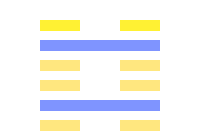
29.2.5.6 (29 > 23) - THE KHAN HEXAGRAM.
- 2. The second line, undivided, shows its subject in all the peril of the defile. He will, however, get a little (of the deliverance) that he seeks.
- 5. The fifth line, undivided, shows the water of the defile not yet full, (so that it might flow away) ; but order will (soon) be brought about. There will be no error.
- 6. The topmost line, divided, shows its subject bound with cords of three strands or two strands, and placed in the thicket of thorns. But in three years he does not learn the course for him to pursue. There will be evil.
29.2.5.6 (29 > 23) - Catching up
One makes more efforts so as not to lose one's abilities.
Bing DeepL Google Yandex29.2.5.6 (29 > 23) - Catching up
One makes more efforts so as not to lose one's abilities.
Bing DeepL Google Yandex29.2.5.6 (29 > 23) - K’ân, l’abîme
K’ān : danger, précipice, caverne. — Tsa k’ān : courir de grands risques ; s’exposer au danger pour un autre.
-
2. Dans les écueils périlleux, si on sait modérer ses sentiments, on pourra en sortir heureusement.
Si on garde la modération. - 5. Mais si le danger n’est pas inéluctable, si une caverne où l’on se trouve n’est point pleine d’eau et qu’on puisse encore aplanir le terrain, on en sortira sans faute. — Il n’arrivera pas malheur.
- 6. Danger de celui qui, lié, vinculé de triples liens, enfermé dans un cachot, ne peut de longtemps parvenir à se délivrer. Sort funeste ! — Tel est celui qui a perdu la voie de la sagesse
29.2.5.6 (29 > 23) - Remonter la pente
On fait plus d'efforts pour ne pas perdre ses capacités.
Bing DeepL Google Yandex29.2.5.6 (29 > 23) - Mélység
- 2. Ha valaki túl nagy nehézségekkel kerül szembe, rá kell hagynia olyanokra akik tudják kezelni azokat.
- 5. Mielőtt visszatérne hogy segítsen másokon, szünetet kell tartania és fel kell készülnie hogy válaszoljon a közelállóknak.
- 6. Ha túl fáradt, meg kell állnia és később folytatnia.
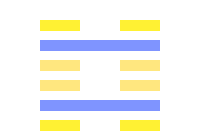
29.1.2.5.6 (29 > 27) - THE KHAN HEXAGRAM.
- 1. The first line, divided, shows its subject in the double defile, and (yet) entering a cavern within it. There will be evil.
- 2. The second line, undivided, shows its subject in all the peril of the defile. He will, however, get a little (of the deliverance) that he seeks.
- 5. The fifth line, undivided, shows the water of the defile not yet full, (so that it might flow away) ; but order will (soon) be brought about. There will be no error.
- 6. The topmost line, divided, shows its subject bound with cords of three strands or two strands, and placed in the thicket of thorns. But in three years he does not learn the course for him to pursue. There will be evil.
29.1.2.5.6 (29 > 27) - Getting a taste for what one is doing
One contributes to the well-being of all by taking appropriate measures.
Bing DeepL Google Yandex29.1.2.5.6 (29 > 27) - Getting a taste for what one is doing
One contributes to the well-being of all by taking appropriate measures.
Bing DeepL Google Yandex29.1.2.5.6 (29 > 27) - K’ân, l’abîme
K’ān : danger, précipice, caverne. — Tsa k’ān : courir de grands risques ; s’exposer au danger pour un autre.
- 1. Courir des dangers, comme entrer dans une caverne d’un défilé dangereux, est chose redoutable.
-
2. Dans les écueils périlleux, si on sait modérer ses sentiments, on pourra en sortir heureusement.
Si on garde la modération. - 5. Mais si le danger n’est pas inéluctable, si une caverne où l’on se trouve n’est point pleine d’eau et qu’on puisse encore aplanir le terrain, on en sortira sans faute. — Il n’arrivera pas malheur.
- 6. Danger de celui qui, lié, vinculé de triples liens, enfermé dans un cachot, ne peut de longtemps parvenir à se délivrer. Sort funeste ! — Tel est celui qui a perdu la voie de la sagesse
29.1.2.5.6 (29 > 27) - Prendre goût à ce qu'on fait
On contribue au bien-être de tous en prenant des mesures adéquates.
Bing DeepL Google Yandex29.1.2.5.6 (29 > 27) - Mélység
- 1. Ha egy nehézséggel találkozott, meg kell oldania mielőtt elkezdene foglalkozni egy másikkal.
- 2. Ha valaki túl nagy nehézségekkel kerül szembe, rá kell hagynia olyanokra akik tudják kezelni azokat.
- 5. Mielőtt visszatérne hogy segítsen másokon, szünetet kell tartania és fel kell készülnie hogy válaszoljon a közelállóknak.
- 6. Ha túl fáradt, meg kell állnia és később folytatnia.

29.3.5.6 (29 > 18) - THE KHAN HEXAGRAM.
- 3. The third line, divided, shows its subject, whether he comes or goes ( = descends or ascends), confronted by a defile. All is peril to him and unrest. (His endeavours) will lead him into the cavern of the pit. There should be no action (in such a case).
- 5. The fifth line, undivided, shows the water of the defile not yet full, (so that it might flow away) ; but order will (soon) be brought about. There will be no error.
- 6. The topmost line, divided, shows its subject bound with cords of three strands or two strands, and placed in the thicket of thorns. But in three years he does not learn the course for him to pursue. There will be evil.
29.3.5.6 (29 > 18) - Refusing the approximations
One rules out taking sides with someone who has not been able to be rigourous.
Bing DeepL Google Yandex29.3.5.6 (29 > 18) - Refusing the approximations
One rules out taking sides with someone who has not been able to be rigorous.
Bing DeepL Google Yandex29.3.5.6 (29 > 18) - K’ân, l’abîme
K’ān : danger, précipice, caverne. — Tsa k’ān : courir de grands risques ; s’exposer au danger pour un autre.
- 3. Si en tout et partout on ne rencontre que danger, que les périls, les sujets de crainte s’accumulent, alors dans un tel danger, il n’y a plus d’expédient qui puisse servir. — Il n’y aura plus de secours possible.
- 5. Mais si le danger n’est pas inéluctable, si une caverne où l’on se trouve n’est point pleine d’eau et qu’on puisse encore aplanir le terrain, on en sortira sans faute. — Il n’arrivera pas malheur.
- 6. Danger de celui qui, lié, vinculé de triples liens, enfermé dans un cachot, ne peut de longtemps parvenir à se délivrer. Sort funeste ! — Tel est celui qui a perdu la voie de la sagesse
29.3.5.6 (29 > 18) - Refuser les à-peu-près
On exclut de prendre parti pour une personne qui n'a pas su faire preuve de rigueur.
Bing DeepL Google Yandex29.3.5.6 (29 > 18) - Mélység
- 3. Látják amit elrontott így odébbáll.
- 5. Mielőtt visszatérne hogy segítsen másokon, szünetet kell tartania és fel kell készülnie hogy válaszoljon a közelállóknak.
- 6. Ha túl fáradt, meg kell állnia és később folytatnia.

29.1.3.5.6 (29 > 26) - THE KHAN HEXAGRAM.
- 1. The first line, divided, shows its subject in the double defile, and (yet) entering a cavern within it. There will be evil.
- 3. The third line, divided, shows its subject, whether he comes or goes ( = descends or ascends), confronted by a defile. All is peril to him and unrest. (His endeavours) will lead him into the cavern of the pit. There should be no action (in such a case).
- 5. The fifth line, undivided, shows the water of the defile not yet full, (so that it might flow away) ; but order will (soon) be brought about. There will be no error.
- 6. The topmost line, divided, shows its subject bound with cords of three strands or two strands, and placed in the thicket of thorns. But in three years he does not learn the course for him to pursue. There will be evil.
29.1.3.5.6 (29 > 26) - Righteous impatience
One recriminates against those who have taken too long to do their job.
Bing DeepL Google Yandex29.1.3.5.6 (29 > 26) - Righteous impatience
One recriminates against those who have taken too long to do their job.
Bing DeepL Google Yandex29.1.3.5.6 (29 > 26) - K’ân, l’abîme
K’ān : danger, précipice, caverne. — Tsa k’ān : courir de grands risques ; s’exposer au danger pour un autre.
- 1. Courir des dangers, comme entrer dans une caverne d’un défilé dangereux, est chose redoutable.
- 3. Si en tout et partout on ne rencontre que danger, que les périls, les sujets de crainte s’accumulent, alors dans un tel danger, il n’y a plus d’expédient qui puisse servir. — Il n’y aura plus de secours possible.
- 5. Mais si le danger n’est pas inéluctable, si une caverne où l’on se trouve n’est point pleine d’eau et qu’on puisse encore aplanir le terrain, on en sortira sans faute. — Il n’arrivera pas malheur.
- 6. Danger de celui qui, lié, vinculé de triples liens, enfermé dans un cachot, ne peut de longtemps parvenir à se délivrer. Sort funeste ! — Tel est celui qui a perdu la voie de la sagesse
29.1.3.5.6 (29 > 26) - Juste impatience
On récrimine contre ceux qui ont pris trop de temps pour accomplir leur travail.
Bing DeepL Google Yandex29.1.3.5.6 (29 > 26) - Mélység
- 1. Ha egy nehézséggel találkozott, meg kell oldania mielőtt elkezdene foglalkozni egy másikkal.
- 3. Látják amit elrontott így odébbáll.
- 5. Mielőtt visszatérne hogy segítsen másokon, szünetet kell tartania és fel kell készülnie hogy válaszoljon a közelállóknak.
- 6. Ha túl fáradt, meg kell állnia és később folytatnia.
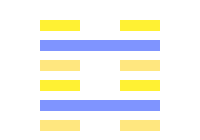
29.2.3.5.6 (29 > 52) - THE KHAN HEXAGRAM.
- 2. The second line, undivided, shows its subject in all the peril of the defile. He will, however, get a little (of the deliverance) that he seeks.
- 3. The third line, divided, shows its subject, whether he comes or goes ( = descends or ascends), confronted by a defile. All is peril to him and unrest. (His endeavours) will lead him into the cavern of the pit. There should be no action (in such a case).
- 5. The fifth line, undivided, shows the water of the defile not yet full, (so that it might flow away) ; but order will (soon) be brought about. There will be no error.
- 6. The topmost line, divided, shows its subject bound with cords of three strands or two strands, and placed in the thicket of thorns. But in three years he does not learn the course for him to pursue. There will be evil.
29.2.3.5.6 (29 > 52) - Spoiling prematurely
One exhausts one's guests by treating them like gods.
Bing DeepL Google Yandex29.2.3.5.6 (29 > 52) - Spoiling prematurely
One exhausts one's guests by treating them like gods.
Bing DeepL Google Yandex29.2.3.5.6 (29 > 52) - K’ân, l’abîme
K’ān : danger, précipice, caverne. — Tsa k’ān : courir de grands risques ; s’exposer au danger pour un autre.
-
2. Dans les écueils périlleux, si on sait modérer ses sentiments, on pourra en sortir heureusement.
Si on garde la modération. - 3. Si en tout et partout on ne rencontre que danger, que les périls, les sujets de crainte s’accumulent, alors dans un tel danger, il n’y a plus d’expédient qui puisse servir. — Il n’y aura plus de secours possible.
- 5. Mais si le danger n’est pas inéluctable, si une caverne où l’on se trouve n’est point pleine d’eau et qu’on puisse encore aplanir le terrain, on en sortira sans faute. — Il n’arrivera pas malheur.
- 6. Danger de celui qui, lié, vinculé de triples liens, enfermé dans un cachot, ne peut de longtemps parvenir à se délivrer. Sort funeste ! — Tel est celui qui a perdu la voie de la sagesse
29.2.3.5.6 (29 > 52) - Gâter prématurément
On épuise ses invités en les traitant comme des dieux.
Bing DeepL Google Yandex29.2.3.5.6 (29 > 52) - Mélység
- 2. Ha valaki túl nagy nehézségekkel kerül szembe, rá kell hagynia olyanokra akik tudják kezelni azokat.
- 3. Látják amit elrontott így odébbáll.
- 5. Mielőtt visszatérne hogy segítsen másokon, szünetet kell tartania és fel kell készülnie hogy válaszoljon a közelállóknak.
- 6. Ha túl fáradt, meg kell állnia és később folytatnia.
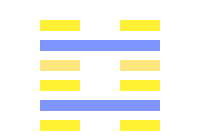
29.1.2.3.5.6 (29 > 22) - THE KHAN HEXAGRAM.
- 1. The first line, divided, shows its subject in the double defile, and (yet) entering a cavern within it. There will be evil.
- 2. The second line, undivided, shows its subject in all the peril of the defile. He will, however, get a little (of the deliverance) that he seeks.
- 3. The third line, divided, shows its subject, whether he comes or goes ( = descends or ascends), confronted by a defile. All is peril to him and unrest. (His endeavours) will lead him into the cavern of the pit. There should be no action (in such a case).
- 5. The fifth line, undivided, shows the water of the defile not yet full, (so that it might flow away) ; but order will (soon) be brought about. There will be no error.
- 6. The topmost line, divided, shows its subject bound with cords of three strands or two strands, and placed in the thicket of thorns. But in three years he does not learn the course for him to pursue. There will be evil.
29.1.2.3.5.6 (29 > 22) - Finding an explanation
One puts into context an event that others cannot understand.
Bing DeepL Google Yandex29.1.2.3.5.6 (29 > 22) - Finding an explanation
One puts into context an event that others cannot understand.
Bing DeepL Google Yandex29.1.2.3.5.6 (29 > 22) - K’ân, l’abîme
K’ān : danger, précipice, caverne. — Tsa k’ān : courir de grands risques ; s’exposer au danger pour un autre.
- 1. Courir des dangers, comme entrer dans une caverne d’un défilé dangereux, est chose redoutable.
-
2. Dans les écueils périlleux, si on sait modérer ses sentiments, on pourra en sortir heureusement.
Si on garde la modération. - 3. Si en tout et partout on ne rencontre que danger, que les périls, les sujets de crainte s’accumulent, alors dans un tel danger, il n’y a plus d’expédient qui puisse servir. — Il n’y aura plus de secours possible.
- 5. Mais si le danger n’est pas inéluctable, si une caverne où l’on se trouve n’est point pleine d’eau et qu’on puisse encore aplanir le terrain, on en sortira sans faute. — Il n’arrivera pas malheur.
- 6. Danger de celui qui, lié, vinculé de triples liens, enfermé dans un cachot, ne peut de longtemps parvenir à se délivrer. Sort funeste ! — Tel est celui qui a perdu la voie de la sagesse
29.1.2.3.5.6 (29 > 22) - Trouver une explication
On replace dans son contexte un événement que les autres n'arrivent pas à comprendre.
Bing DeepL Google Yandex29.1.2.3.5.6 (29 > 22) - Mélység
- 1. Ha egy nehézséggel találkozott, meg kell oldania mielőtt elkezdene foglalkozni egy másikkal.
- 2. Ha valaki túl nagy nehézségekkel kerül szembe, rá kell hagynia olyanokra akik tudják kezelni azokat.
- 3. Látják amit elrontott így odébbáll.
- 5. Mielőtt visszatérne hogy segítsen másokon, szünetet kell tartania és fel kell készülnie hogy válaszoljon a közelállóknak.
- 6. Ha túl fáradt, meg kell állnia és később folytatnia.

29.4.5.6 (29 > 64) - THE KHAN HEXAGRAM.
- 4. The fourth line, divided, shows its subject (at a feast), with (simply) a bottle of spirits, and a subsidiary basket of rice, while (the cups and bowls) are (only) of earthenware. He introduces his important lessons (as his ruler's) intelligence admits. There will in the end be no error.
- 5. The fifth line, undivided, shows the water of the defile not yet full, (so that it might flow away) ; but order will (soon) be brought about. There will be no error.
- 6. The topmost line, divided, shows its subject bound with cords of three strands or two strands, and placed in the thicket of thorns. But in three years he does not learn the course for him to pursue. There will be evil.
29.4.5.6 (29 > 64) - Recognising separation
One puts an end to doubts by formalising the break-up.
Bing DeepL Google Yandex29.4.5.6 (29 > 64) - Recognizing separation
One puts an end to doubts by formalizing the break-up.
Bing DeepL Google Yandex29.4.5.6 (29 > 64) - K’ân, l’abîme
K’ān : danger, précipice, caverne. — Tsa k’ān : courir de grands risques ; s’exposer au danger pour un autre.
- 4. Si l’on offre des sacrifices avec simplicité (sans ostentation), avec un vase de spiritueux et une corbeille de grains, tandis que les assistants n’ont que des vases de terre, si par cette modération on se forme à la vertu, alors qu’on aurait d’abord des difficultés et des écueils, on deviendra irréprochable. (Moyen d’éviter les dangers.)
- 5. Mais si le danger n’est pas inéluctable, si une caverne où l’on se trouve n’est point pleine d’eau et qu’on puisse encore aplanir le terrain, on en sortira sans faute. — Il n’arrivera pas malheur.
- 6. Danger de celui qui, lié, vinculé de triples liens, enfermé dans un cachot, ne peut de longtemps parvenir à se délivrer. Sort funeste ! — Tel est celui qui a perdu la voie de la sagesse
29.4.5.6 (29 > 64) - Reconnaître la séparation
On met fin aux doutes en officialisant la rupture.
Bing DeepL Google Yandex29.4.5.6 (29 > 64) - Mélység
- 4. Ha valaki eszközök híján van, meg kell elégednie egyszerű dolgokkal.
- 5. Mielőtt visszatérne hogy segítsen másokon, szünetet kell tartania és fel kell készülnie hogy válaszoljon a közelállóknak.
- 6. Ha túl fáradt, meg kell állnia és később folytatnia.

29.1.4.5.6 (29 > 38) - THE KHAN HEXAGRAM.
- 1. The first line, divided, shows its subject in the double defile, and (yet) entering a cavern within it. There will be evil.
- 4. The fourth line, divided, shows its subject (at a feast), with (simply) a bottle of spirits, and a subsidiary basket of rice, while (the cups and bowls) are (only) of earthenware. He introduces his important lessons (as his ruler's) intelligence admits. There will in the end be no error.
- 5. The fifth line, undivided, shows the water of the defile not yet full, (so that it might flow away) ; but order will (soon) be brought about. There will be no error.
- 6. The topmost line, divided, shows its subject bound with cords of three strands or two strands, and placed in the thicket of thorns. But in three years he does not learn the course for him to pursue. There will be evil.
29.1.4.5.6 (29 > 38) - Being observant
One becomes less likely to make mistakes when one has received the corresponding training.
Bing DeepL Google Yandex29.1.4.5.6 (29 > 38) - Being observant
One becomes less likely to make mistakes when one has received the corresponding training.
Bing DeepL Google Yandex29.1.4.5.6 (29 > 38) - K’ân, l’abîme
K’ān : danger, précipice, caverne. — Tsa k’ān : courir de grands risques ; s’exposer au danger pour un autre.
- 1. Courir des dangers, comme entrer dans une caverne d’un défilé dangereux, est chose redoutable.
- 4. Si l’on offre des sacrifices avec simplicité (sans ostentation), avec un vase de spiritueux et une corbeille de grains, tandis que les assistants n’ont que des vases de terre, si par cette modération on se forme à la vertu, alors qu’on aurait d’abord des difficultés et des écueils, on deviendra irréprochable. (Moyen d’éviter les dangers.)
- 5. Mais si le danger n’est pas inéluctable, si une caverne où l’on se trouve n’est point pleine d’eau et qu’on puisse encore aplanir le terrain, on en sortira sans faute. — Il n’arrivera pas malheur.
- 6. Danger de celui qui, lié, vinculé de triples liens, enfermé dans un cachot, ne peut de longtemps parvenir à se délivrer. Sort funeste ! — Tel est celui qui a perdu la voie de la sagesse
29.1.4.5.6 (29 > 38) - Être regardant
On devient moins susceptible de faire des erreurs quand on a reçu la formation correspondante.
Bing DeepL Google Yandex29.1.4.5.6 (29 > 38) - Mélység
- 1. Ha egy nehézséggel találkozott, meg kell oldania mielőtt elkezdene foglalkozni egy másikkal.
- 4. Ha valaki eszközök híján van, meg kell elégednie egyszerű dolgokkal.
- 5. Mielőtt visszatérne hogy segítsen másokon, szünetet kell tartania és fel kell készülnie hogy válaszoljon a közelállóknak.
- 6. Ha túl fáradt, meg kell állnia és később folytatnia.
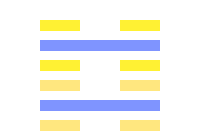
29.2.4.5.6 (29 > 35) - THE KHAN HEXAGRAM.
- 2. The second line, undivided, shows its subject in all the peril of the defile. He will, however, get a little (of the deliverance) that he seeks.
- 4. The fourth line, divided, shows its subject (at a feast), with (simply) a bottle of spirits, and a subsidiary basket of rice, while (the cups and bowls) are (only) of earthenware. He introduces his important lessons (as his ruler's) intelligence admits. There will in the end be no error.
- 5. The fifth line, undivided, shows the water of the defile not yet full, (so that it might flow away) ; but order will (soon) be brought about. There will be no error.
- 6. The topmost line, divided, shows its subject bound with cords of three strands or two strands, and placed in the thicket of thorns. But in three years he does not learn the course for him to pursue. There will be evil.
29.2.4.5.6 (29 > 35) - Refueling
One recovers strength before going to face one's opponents.
29.2.4.5.6 (29 > 35) - Refueling
One recovers strength before going to face one's opponents.
29.2.4.5.6 (29 > 35) - K’ân, l’abîme
K’ān : danger, précipice, caverne. — Tsa k’ān : courir de grands risques ; s’exposer au danger pour un autre.
-
2. Dans les écueils périlleux, si on sait modérer ses sentiments, on pourra en sortir heureusement.
Si on garde la modération. - 4. Si l’on offre des sacrifices avec simplicité (sans ostentation), avec un vase de spiritueux et une corbeille de grains, tandis que les assistants n’ont que des vases de terre, si par cette modération on se forme à la vertu, alors qu’on aurait d’abord des difficultés et des écueils, on deviendra irréprochable. (Moyen d’éviter les dangers.)
- 5. Mais si le danger n’est pas inéluctable, si une caverne où l’on se trouve n’est point pleine d’eau et qu’on puisse encore aplanir le terrain, on en sortira sans faute. — Il n’arrivera pas malheur.
- 6. Danger de celui qui, lié, vinculé de triples liens, enfermé dans un cachot, ne peut de longtemps parvenir à se délivrer. Sort funeste ! — Tel est celui qui a perdu la voie de la sagesse
29.2.4.5.6 (29 > 35) - Se restaurer
On reprend des forces avant d'aller affronter ses adversaires.
Bing DeepL Google Yandex29.2.4.5.6 (29 > 35) - Mélység
- 2. Ha valaki túl nagy nehézségekkel kerül szembe, rá kell hagynia olyanokra akik tudják kezelni azokat.
- 4. Ha valaki eszközök híján van, meg kell elégednie egyszerű dolgokkal.
- 5. Mielőtt visszatérne hogy segítsen másokon, szünetet kell tartania és fel kell készülnie hogy válaszoljon a közelállóknak.
- 6. Ha túl fáradt, meg kell állnia és később folytatnia.
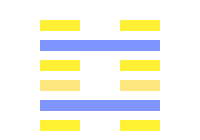
29.1.2.4.5.6 (29 > 21) - THE KHAN HEXAGRAM.
- 1. The first line, divided, shows its subject in the double defile, and (yet) entering a cavern within it. There will be evil.
- 2. The second line, undivided, shows its subject in all the peril of the defile. He will, however, get a little (of the deliverance) that he seeks.
- 4. The fourth line, divided, shows its subject (at a feast), with (simply) a bottle of spirits, and a subsidiary basket of rice, while (the cups and bowls) are (only) of earthenware. He introduces his important lessons (as his ruler's) intelligence admits. There will in the end be no error.
- 5. The fifth line, undivided, shows the water of the defile not yet full, (so that it might flow away) ; but order will (soon) be brought about. There will be no error.
- 6. The topmost line, divided, shows its subject bound with cords of three strands or two strands, and placed in the thicket of thorns. But in three years he does not learn the course for him to pursue. There will be evil.
29.1.2.4.5.6 (29 > 21) - Wanting more and more
One is asking even more of those who have already given everything.
Bing DeepL Google Yandex29.1.2.4.5.6 (29 > 21) - Wanting more and more
One is asking even more of those who have already given everything.
Bing DeepL Google Yandex29.1.2.4.5.6 (29 > 21) - K’ân, l’abîme
K’ān : danger, précipice, caverne. — Tsa k’ān : courir de grands risques ; s’exposer au danger pour un autre.
- 1. Courir des dangers, comme entrer dans une caverne d’un défilé dangereux, est chose redoutable.
-
2. Dans les écueils périlleux, si on sait modérer ses sentiments, on pourra en sortir heureusement.
Si on garde la modération. - 4. Si l’on offre des sacrifices avec simplicité (sans ostentation), avec un vase de spiritueux et une corbeille de grains, tandis que les assistants n’ont que des vases de terre, si par cette modération on se forme à la vertu, alors qu’on aurait d’abord des difficultés et des écueils, on deviendra irréprochable. (Moyen d’éviter les dangers.)
- 5. Mais si le danger n’est pas inéluctable, si une caverne où l’on se trouve n’est point pleine d’eau et qu’on puisse encore aplanir le terrain, on en sortira sans faute. — Il n’arrivera pas malheur.
- 6. Danger de celui qui, lié, vinculé de triples liens, enfermé dans un cachot, ne peut de longtemps parvenir à se délivrer. Sort funeste ! — Tel est celui qui a perdu la voie de la sagesse
29.1.2.4.5.6 (29 > 21) - Vouloir toujours plus
On réclame encore davantage à ceux qui ont déjà tout donné.
Bing DeepL Google Yandex29.1.2.4.5.6 (29 > 21) - Mélység
- 1. Ha egy nehézséggel találkozott, meg kell oldania mielőtt elkezdene foglalkozni egy másikkal.
- 2. Ha valaki túl nagy nehézségekkel kerül szembe, rá kell hagynia olyanokra akik tudják kezelni azokat.
- 4. Ha valaki eszközök híján van, meg kell elégednie egyszerű dolgokkal.
- 5. Mielőtt visszatérne hogy segítsen másokon, szünetet kell tartania és fel kell készülnie hogy válaszoljon a közelállóknak.
- 6. Ha túl fáradt, meg kell állnia és később folytatnia.

29.3.4.5.6 (29 > 50) - THE KHAN HEXAGRAM.
- 3. The third line, divided, shows its subject, whether he comes or goes ( = descends or ascends), confronted by a defile. All is peril to him and unrest. (His endeavours) will lead him into the cavern of the pit. There should be no action (in such a case).
- 4. The fourth line, divided, shows its subject (at a feast), with (simply) a bottle of spirits, and a subsidiary basket of rice, while (the cups and bowls) are (only) of earthenware. He introduces his important lessons (as his ruler's) intelligence admits. There will in the end be no error.
- 5. The fifth line, undivided, shows the water of the defile not yet full, (so that it might flow away) ; but order will (soon) be brought about. There will be no error.
- 6. The topmost line, divided, shows its subject bound with cords of three strands or two strands, and placed in the thicket of thorns. But in three years he does not learn the course for him to pursue. There will be evil.
29.3.4.5.6 (29 > 50) - Choosing sides
One splashes the others to exculpate oneself.
Bing DeepL Google Yandex29.3.4.5.6 (29 > 50) - Choosing sides
One splashes the others to exculpate oneself.
Bing DeepL Google Yandex29.3.4.5.6 (29 > 50) - K’ân, l’abîme
K’ān : danger, précipice, caverne. — Tsa k’ān : courir de grands risques ; s’exposer au danger pour un autre.
- 3. Si en tout et partout on ne rencontre que danger, que les périls, les sujets de crainte s’accumulent, alors dans un tel danger, il n’y a plus d’expédient qui puisse servir. — Il n’y aura plus de secours possible.
- 4. Si l’on offre des sacrifices avec simplicité (sans ostentation), avec un vase de spiritueux et une corbeille de grains, tandis que les assistants n’ont que des vases de terre, si par cette modération on se forme à la vertu, alors qu’on aurait d’abord des difficultés et des écueils, on deviendra irréprochable. (Moyen d’éviter les dangers.)
- 5. Mais si le danger n’est pas inéluctable, si une caverne où l’on se trouve n’est point pleine d’eau et qu’on puisse encore aplanir le terrain, on en sortira sans faute. — Il n’arrivera pas malheur.
- 6. Danger de celui qui, lié, vinculé de triples liens, enfermé dans un cachot, ne peut de longtemps parvenir à se délivrer. Sort funeste ! — Tel est celui qui a perdu la voie de la sagesse
29.3.4.5.6 (29 > 50) - Choisir son camp
On éclabousse les autres pour se disculper.
Bing DeepL Google Yandex29.3.4.5.6 (29 > 50) - Mélység
- 3. Látják amit elrontott így odébbáll.
- 4. Ha valaki eszközök híján van, meg kell elégednie egyszerű dolgokkal.
- 5. Mielőtt visszatérne hogy segítsen másokon, szünetet kell tartania és fel kell készülnie hogy válaszoljon a közelállóknak.
- 6. Ha túl fáradt, meg kell állnia és később folytatnia.

29.1.3.4.5.6 (29 > 14) - THE KHAN HEXAGRAM.
- 1. The first line, divided, shows its subject in the double defile, and (yet) entering a cavern within it. There will be evil.
- 3. The third line, divided, shows its subject, whether he comes or goes ( = descends or ascends), confronted by a defile. All is peril to him and unrest. (His endeavours) will lead him into the cavern of the pit. There should be no action (in such a case).
- 4. The fourth line, divided, shows its subject (at a feast), with (simply) a bottle of spirits, and a subsidiary basket of rice, while (the cups and bowls) are (only) of earthenware. He introduces his important lessons (as his ruler's) intelligence admits. There will in the end be no error.
- 5. The fifth line, undivided, shows the water of the defile not yet full, (so that it might flow away) ; but order will (soon) be brought about. There will be no error.
- 6. The topmost line, divided, shows its subject bound with cords of three strands or two strands, and placed in the thicket of thorns. But in three years he does not learn the course for him to pursue. There will be evil.
29.1.3.4.5.6 (29 > 14) - Lacking of thinking
One thinks being right against all common sense.
Bing DeepL Google Yandex29.1.3.4.5.6 (29 > 14) - Lacking of thinking
One thinks being right against all common sense.
Bing DeepL Google Yandex29.1.3.4.5.6 (29 > 14) - K’ân, l’abîme
K’ān : danger, précipice, caverne. — Tsa k’ān : courir de grands risques ; s’exposer au danger pour un autre.
- 1. Courir des dangers, comme entrer dans une caverne d’un défilé dangereux, est chose redoutable.
- 3. Si en tout et partout on ne rencontre que danger, que les périls, les sujets de crainte s’accumulent, alors dans un tel danger, il n’y a plus d’expédient qui puisse servir. — Il n’y aura plus de secours possible.
- 4. Si l’on offre des sacrifices avec simplicité (sans ostentation), avec un vase de spiritueux et une corbeille de grains, tandis que les assistants n’ont que des vases de terre, si par cette modération on se forme à la vertu, alors qu’on aurait d’abord des difficultés et des écueils, on deviendra irréprochable. (Moyen d’éviter les dangers.)
- 5. Mais si le danger n’est pas inéluctable, si une caverne où l’on se trouve n’est point pleine d’eau et qu’on puisse encore aplanir le terrain, on en sortira sans faute. — Il n’arrivera pas malheur.
- 6. Danger de celui qui, lié, vinculé de triples liens, enfermé dans un cachot, ne peut de longtemps parvenir à se délivrer. Sort funeste ! — Tel est celui qui a perdu la voie de la sagesse
29.1.3.4.5.6 (29 > 14) - Manquer de réflexion
On pense avoir raison en dépit du bon sens.
Bing DeepL Google Yandex29.1.3.4.5.6 (29 > 14) - Mélység
- 1. Ha egy nehézséggel találkozott, meg kell oldania mielőtt elkezdene foglalkozni egy másikkal.
- 3. Látják amit elrontott így odébbáll.
- 4. Ha valaki eszközök híján van, meg kell elégednie egyszerű dolgokkal.
- 5. Mielőtt visszatérne hogy segítsen másokon, szünetet kell tartania és fel kell készülnie hogy válaszoljon a közelállóknak.
- 6. Ha túl fáradt, meg kell állnia és később folytatnia.
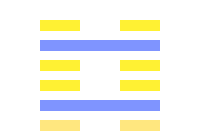
29.2.3.4.5.6 (29 > 56) - THE KHAN HEXAGRAM.
- 2. The second line, undivided, shows its subject in all the peril of the defile. He will, however, get a little (of the deliverance) that he seeks.
- 3. The third line, divided, shows its subject, whether he comes or goes ( = descends or ascends), confronted by a defile. All is peril to him and unrest. (His endeavours) will lead him into the cavern of the pit. There should be no action (in such a case).
- 4. The fourth line, divided, shows its subject (at a feast), with (simply) a bottle of spirits, and a subsidiary basket of rice, while (the cups and bowls) are (only) of earthenware. He introduces his important lessons (as his ruler's) intelligence admits. There will in the end be no error.
- 5. The fifth line, undivided, shows the water of the defile not yet full, (so that it might flow away) ; but order will (soon) be brought about. There will be no error.
- 6. The topmost line, divided, shows its subject bound with cords of three strands or two strands, and placed in the thicket of thorns. But in three years he does not learn the course for him to pursue. There will be evil.
29.2.3.4.5.6 (29 > 56) - Finding a common ground
One ends an altercation by offering to share the blame between those who are fighting.
Bing DeepL Google Yandex29.2.3.4.5.6 (29 > 56) - Finding a common ground
One ends an altercation by offering to share the blame between those who are fighting.
Bing DeepL Google Yandex29.2.3.4.5.6 (29 > 56) - K’ân, l’abîme
K’ān : danger, précipice, caverne. — Tsa k’ān : courir de grands risques ; s’exposer au danger pour un autre.
-
2. Dans les écueils périlleux, si on sait modérer ses sentiments, on pourra en sortir heureusement.
Si on garde la modération. - 3. Si en tout et partout on ne rencontre que danger, que les périls, les sujets de crainte s’accumulent, alors dans un tel danger, il n’y a plus d’expédient qui puisse servir. — Il n’y aura plus de secours possible.
- 4. Si l’on offre des sacrifices avec simplicité (sans ostentation), avec un vase de spiritueux et une corbeille de grains, tandis que les assistants n’ont que des vases de terre, si par cette modération on se forme à la vertu, alors qu’on aurait d’abord des difficultés et des écueils, on deviendra irréprochable. (Moyen d’éviter les dangers.)
- 5. Mais si le danger n’est pas inéluctable, si une caverne où l’on se trouve n’est point pleine d’eau et qu’on puisse encore aplanir le terrain, on en sortira sans faute. — Il n’arrivera pas malheur.
- 6. Danger de celui qui, lié, vinculé de triples liens, enfermé dans un cachot, ne peut de longtemps parvenir à se délivrer. Sort funeste ! — Tel est celui qui a perdu la voie de la sagesse
29.2.3.4.5.6 (29 > 56) - Trouver un terrain d'entente
On met fin à une altercation en proposant à ceux qui s'affrontent de partager les torts.
Bing DeepL Google Yandex29.2.3.4.5.6 (29 > 56) - Mélység
- 2. Ha valaki túl nagy nehézségekkel kerül szembe, rá kell hagynia olyanokra akik tudják kezelni azokat.
- 3. Látják amit elrontott így odébbáll.
- 4. Ha valaki eszközök híján van, meg kell elégednie egyszerű dolgokkal.
- 5. Mielőtt visszatérne hogy segítsen másokon, szünetet kell tartania és fel kell készülnie hogy válaszoljon a közelállóknak.
- 6. Ha túl fáradt, meg kell állnia és később folytatnia.
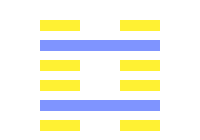
29.1.2.3.4.5.6 (29 > 30) - THE KHAN HEXAGRAM.
- 1. The first line, divided, shows its subject in the double defile, and (yet) entering a cavern within it. There will be evil.
- 2. The second line, undivided, shows its subject in all the peril of the defile. He will, however, get a little (of the deliverance) that he seeks.
- 3. The third line, divided, shows its subject, whether he comes or goes ( = descends or ascends), confronted by a defile. All is peril to him and unrest. (His endeavours) will lead him into the cavern of the pit. There should be no action (in such a case).
- 4. The fourth line, divided, shows its subject (at a feast), with (simply) a bottle of spirits, and a subsidiary basket of rice, while (the cups and bowls) are (only) of earthenware. He introduces his important lessons (as his ruler's) intelligence admits. There will in the end be no error.
- 5. The fifth line, undivided, shows the water of the defile not yet full, (so that it might flow away) ; but order will (soon) be brought about. There will be no error.
- 6. The topmost line, divided, shows its subject bound with cords of three strands or two strands, and placed in the thicket of thorns. But in three years he does not learn the course for him to pursue. There will be evil.
29.1.2.3.4.5.6 (29 > 30) - Not risking more
One lacks courage to dare tempting the devil once again.
Bing DeepL Google Yandex29.1.2.3.4.5.6 (29 > 30) - Not risking more
One lacks courage to dare tempting the devil once again.
Bing DeepL Google Yandex29.1.2.3.4.5.6 (29 > 30) - K’ân, l’abîme
K’ān : danger, précipice, caverne. — Tsa k’ān : courir de grands risques ; s’exposer au danger pour un autre.
- 1. Courir des dangers, comme entrer dans une caverne d’un défilé dangereux, est chose redoutable.
-
2. Dans les écueils périlleux, si on sait modérer ses sentiments, on pourra en sortir heureusement.
Si on garde la modération. - 3. Si en tout et partout on ne rencontre que danger, que les périls, les sujets de crainte s’accumulent, alors dans un tel danger, il n’y a plus d’expédient qui puisse servir. — Il n’y aura plus de secours possible.
- 4. Si l’on offre des sacrifices avec simplicité (sans ostentation), avec un vase de spiritueux et une corbeille de grains, tandis que les assistants n’ont que des vases de terre, si par cette modération on se forme à la vertu, alors qu’on aurait d’abord des difficultés et des écueils, on deviendra irréprochable. (Moyen d’éviter les dangers.)
- 5. Mais si le danger n’est pas inéluctable, si une caverne où l’on se trouve n’est point pleine d’eau et qu’on puisse encore aplanir le terrain, on en sortira sans faute. — Il n’arrivera pas malheur.
- 6. Danger de celui qui, lié, vinculé de triples liens, enfermé dans un cachot, ne peut de longtemps parvenir à se délivrer. Sort funeste ! — Tel est celui qui a perdu la voie de la sagesse
29.1.2.3.4.5.6 (29 > 30) - Ne pas risquer plus
On manque de courage pour oser tenter le diable encore une fois.
Bing DeepL Google Yandex29.1.2.3.4.5.6 (29 > 30) - Mélység
- 1. Ha egy nehézséggel találkozott, meg kell oldania mielőtt elkezdene foglalkozni egy másikkal.
- 2. Ha valaki túl nagy nehézségekkel kerül szembe, rá kell hagynia olyanokra akik tudják kezelni azokat.
- 3. Látják amit elrontott így odébbáll.
- 4. Ha valaki eszközök híján van, meg kell elégednie egyszerű dolgokkal.
- 5. Mielőtt visszatérne hogy segítsen másokon, szünetet kell tartania és fel kell készülnie hogy válaszoljon a közelállóknak.
- 6. Ha túl fáradt, meg kell állnia és később folytatnia.

